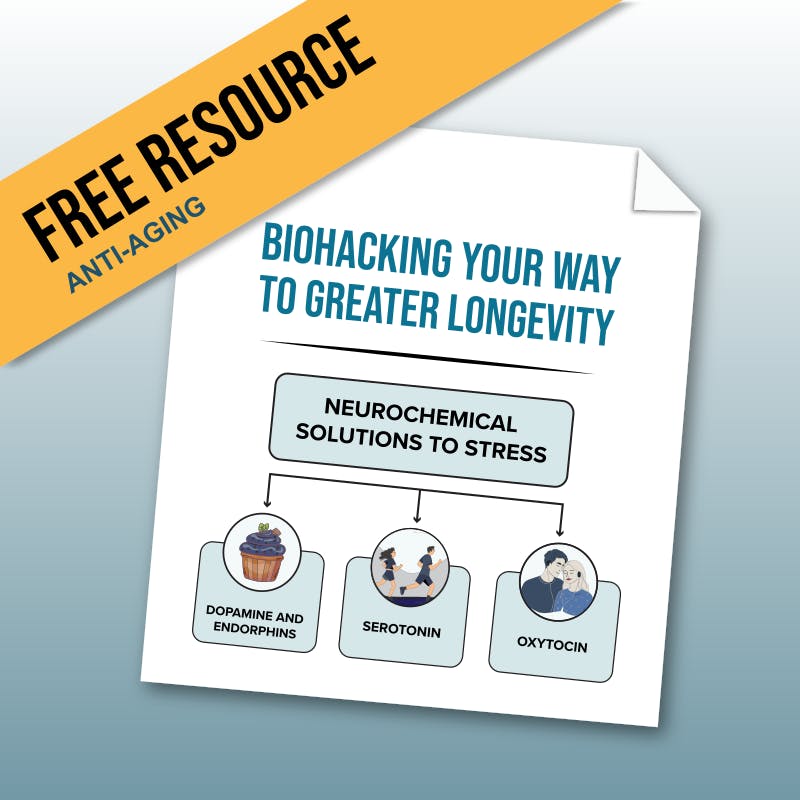Best Mushroom Coffee
Whether you’re looking to elevate or replace your morning brew, mushroom coffee may be a solution. We’ll help you choose the best in 2025.
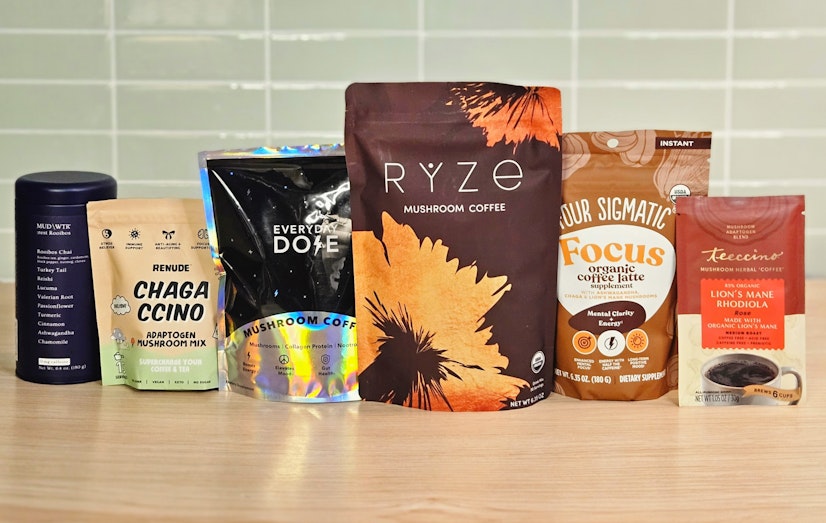
Photo by Innerbody Research
Coffee is one of the most popular beverages in America; it comes second to water (both bottled and unbottled) in popularity,1 and 73% of American adults drink it every day.2 Because it has such a large following, it may be unsurprising to see some businesses aiming to provide an improved version of coffee with added health benefits. One such product that’s been growing in popularity over the past few years is mushroom coffee, which is typically an instant drink mix comprising various functional (or “medicinal”) mushrooms and a lower concentration of coffee — and caffeine — than you’d find in an average cup. And if coffee isn’t quite your thing, you can also find mushroom coffees made with hot chocolate, teas, and more.
But is mushroom coffee really any better than normal coffee? Do the health and wellness benefits companies often claim (like enhanced focus and mood) have any scientific research to back them up? And with so many mushroom coffee options on the market today, where should you start if you want to try one?
We answer all these questions and others in this guide to the best mushroom coffee. If you’re short on time, check out the rundown of our recommendations below.
Summary of recommendations
- Best for most people: RYZE Mushroom Coffee
- Best budget pick: Teeccino Mushroom Herbal Coffee
- Best tasting: ReNude Chagaccino
- Best decaf option: Teeccino Mushroom Herbal Coffee
- Best nootropics blend: Everyday Dose
- Best adaptogen blend: Four Sigmatic Focus Latte
- Best evening blend: MUD\WTR Rest
Ryze’s flavor is closest to coffee, and its dedication to using “full-spectrum” whole mushrooms, grown in the U.S., sets it apart from much of the competition.
Ryze is certified organic by California Certified Organic Farmers. And “full-spectrum,” in this case, means that the mushrooms are allowed to complete their life cycle before being harvested for you to reap the benefits. Ryze’s subscription discount keeps its prices better than most, and a money-back guarantee protects you from losing money if dissatisfied. Ryze is also available via Amazon, but apparent fulfillment issues there (and automatic free shipping via the company’s website) lead us to recommend you buy directly on Ryze.
Jump to:
Why you should trust us
Over the past two decades, Innerbody Research has helped tens of millions of readers make more informed decisions involving staying healthy and living healthier lifestyles.
For this guide, our team thoroughly researched mushroom coffees — and the most commonly included mushrooms — to see if current scientific literature backs up the benefits claimed by manufacturers. We also scoured the competitive landscape, interacted at length with various customer service representatives, purchased products, and personally tested them to help you make an informed choice. All told, our team has dedicated 125+ cumulative hours (over 90 of which were spent on research alone) to this guide and related mushroom coffee reviews. As the mushroom coffee industry continues to grow and new research on functional mushrooms becomes available, we’ll update our information accordingly.
Additionally, like all health-related content on this website, this review was thoroughly vetted by one or more members of our Medical Review Board for accuracy.
How we evaluated mushroom coffees
Whenever we evaluate products, we first consider the criteria we’ll be judging them by (this is always what we feel is most vital to consumers). Often, it’s a straightforward process. But in cases like mushroom coffee, we need to think a bit outside the box.
While coffee is most often viewed as a beverage, it can also be considered a dietary supplement. People use certain supplements to boost their energy levels, cognitive function, or overall health and wellness — and coffee, which is rich in caffeine and antioxidants,3 can potentially provide many of these benefits.4 And mushroom coffee, with its focus on supplemental functional mushrooms, along with other adaptogens and botanicals (often paired with regular coffee), aligns even closer with the FDA’s definition of a dietary supplement.5
With that in mind, we evaluated mushroom coffees similarly to how we’d typically judge a supplement — by their efficacy, safety, cost, and convenience. And, since mushroom coffees are products you’d be drinking (and hopefully enjoying) regularly, we also added a criterion for the all-important taste factor.
Efficacy
Winner: RYZE Mushroom Coffee
When it comes to the efficacy of any functional mushroom product, you may come across varying opinions. Some people — and companies — feel mushrooms’ fruiting bodies are the only way to go, others proclaim the benefits of the mycelium, and still others suggest that using the entire mushroom is ideal. So, which is the most effective part of the mushroom?
Based on the scientific literature we’ve pored over for this guide, we’ve concluded that the answer isn’t all that simple. Functional mushrooms are a complex subject — one that requires substantially more research — and every mushroom’s various parts may have different potential benefits.6 7 Because of this, we’re currently inclined to favor products that make use of the whole mushroom, but that doesn’t mean we’ve ignored the potential of products that don’t.
With that being said, here are the parts of the mushroom each of our top picks uses:
| Fruiting bodies | Mycelium | Whole mushroom | Full-spectrum | |
|---|---|---|---|---|
| RYZE | ||||
| Teeccino | ||||
| ReNude | ||||
| Everyday Dose | ||||
| Four Sigmatic | ||||
| MUD\WTR |
Note: Teeccino uses the whole mushroom in all but one mushroom coffee variety (Tremella Tulsi Cardamom).
As you can see, RYZE, Teeccino, and MUD\WTR are the only products in our top picks that use the whole mushroom. Additionally, RYZE and MUD\WTR both use “full-spectrum” mushrooms that are allowed to complete their entire life cycle before harvest.
When a company uses “full-spectrum” mushrooms, it means that the fruiting body, mycelium, and other stages of growth (like the spores) are also used. This method is sometimes considered similar to the “entourage effect” used to describe certain cannabis or CBD products — a possible synergistic effect between cannabinoids and terpenes resulting in more benefits.126 In the case of full-spectrum functional mushrooms, however, this idea suggests that using the entire lifecycle of the mushroom may lead to more positive outcomes than using only one or two parts.
Now, to choose the most effective of our top mushroom coffee picks, we based our verdict on what each company claims its product can do and any supporting research that exists. With each manufacturer making different claims — and much of the research on functional mushrooms being in its infancy — we felt our approach was a fair, consumer-focused way to judge the products at this point in time.
We’ll examine the efficacy details of our top picks in each product's dedicated section later on, but the sum of it is that RYZE stands out as the winner (and our recommendation for most people) because of its broad selection of six full-spectrum medicinal mushrooms that generally have positive research supporting the company’s claims. For example, RYZE states king trumpet mushrooms can improve longevity, and a 2023 analysis found the mushroom’s polysaccharide content may boost antioxidants and reduce free radicals (the latter of which plays a role in the development of cancer, heart disease, and other chronic or degenerative conditions).8 9
MUD\WTR Rest is a close runner-up for efficacy because it contains two full-spectrum mushrooms along with botanical ingredients like ashwagandha,10 passionflower,11 chamomile,12 and valerian root.13 The botanicals can promote a sense of calm and may improve sleep quality, which falls right in line with the company’s promises for this product.
In contrast, one of ReNude’s claims is that chaga can have “beautifying” effects due to its high melanin content,14 but that’s a bit exaggerated. Chaga’s antioxidant and anti-inflammatory potential,15 which can be partially attributed to melanin,16 may help to reduce or slow the appearance of skin aging, but we couldn’t find any research to support the claim that it “beautifies the pigment in your skin, eyes, and overall radiance.”17 18
Safety
Winner: MUD\WTR
Before discussing this criterion in detail (and how MUD\WTR came out on top), it’s important to note that all of our top mushroom coffee picks adhere to strict testing and safety standards; they're all generally safe for most healthy adults who aren’t pregnant or breastfeeding.
Insider Tip: Those who are pregnant or breastfeeding may want to avoid mushroom coffee, or at least get the okay from a doctor first. While it may sound like a safe alternative to coffee because of the reduced or absent caffeine content, not enough research exists on the effects of using functional mushrooms during pregnancy. It’s also not clear whether the mushrooms or other ingredients you consume can enter breast milk and negatively affect your baby.
Since the FDA doesn’t regulate supplemental products in the same way as medications, we instead look at the steps a company takes to ensure consumer safety,19 like third-party testing and certifications. We also check for common allergens and other ingredients that may be unsafe for people with dietary restrictions (e.g., gluten, nuts). The chart below covers the basic safety information of our top picks.
Each company’s testing procedures were of particular importance, too, because mushrooms are heterotrophs.20 This means that, unlike plants, mushrooms can’t produce their own nutrients. In order to “eat,” they absorb organic compounds from the surrounding environment,21 which puts them at high risk for accumulating heavy metals and other toxins.22 23 These contaminants can then be passed on to any animal that consumes them, humans included. With this in mind, third-party testing for heavy metals became a requirement for any mushroom coffee product we’d recommend (meaning that all of our picks conduct this testing).
Insider Tip: MUD\WTR Rest, certain flavors of Teeccino, and Four Sigmatic Focus all contain ashwagandha, which may cause “spontaneous abortion” (or miscarriage) in those who are pregnant.10 Experts also advise people who are breastfeeding to avoid it. Even if your doctor says mushroom coffee should be safe for you, these particular products — and any others containing ashwagandha — should be avoided.
Our top safety concerns regarding ingredients were allergens, gluten-free status, sweeteners, caffeine content, and vegan-friendliness. Additional ingredients matter, of course, but they’re often botanical ingredients whose safety risks pertain largely to people with medical conditions or who are taking prescription medications. We cover those risks under the “Who is mushroom coffee for?” and “Is mushroom coffee safe?” sections later in this guide.
MUD\WTR Rest earned our choice for safety due to:
- Having third-party testing
- Being certified USDA organic
- Using vegan-friendly, gluten-free ingredients
- Containing 0mg caffeine (other varieties of MUD\WTR contain some caffeine)
- Not including any sweeteners or common allergens
- Conducting DNA tests on mushrooms to ensure their identity
Ultimately, though, if you aren’t pregnant or breastfeeding, and you don’t have any allergies, dietary restrictions, or medical conditions that contraindicate the use of caffeine or certain botanicals, then all of our top picks should be generally safe. However, we always recommend speaking with your doctor first to make sure new supplemental products (including mushroom coffee) are safe for you.
Cost
Winner: Teeccino Mushroom Herbal Coffee
Generally, most mushroom coffees seem expensive up front. However, if you break down the price per serving, mushroom coffee is often less expensive than purchasing a daily coffee at a chain. For reference, here’s a quick list of the current prices for a small original coffee from some popular U.S. coffee chains (these can vary a bit by region):
- Dunkin’ original blend, small: $2.09
- Starbucks freshly brewed coffee, tall: $2.65
- Peet’s light roast, small: $3.40
- Caribou dark or light roast, small: $2.69
Now, let’s examine the standard prices and costs per serving of our top mushroom coffee picks, along with available subscription discounts. The chart below details pricing for a month’s worth of product. (Note that Teeccino’s products contain 28 servings instead of 30.)
| Standard price | Standard cost per serving | Discount if you subscribe | Cost per serving when subscribed | |
|---|---|---|---|---|
| RYZE Mushroom Coffee | $45 | $1.50 | $36 (20% off) | $1.20 |
| Everyday Dose | $45 | $1.50 | $36 (20% off) | $1.20 |
| ReNude Chagaccino | $50 | $1.67 | $45 (10% off) | $1.50 |
| Teeccino Mushroom Herbal Coffee | $17 | $0.61 | $14.44 (15% off) | $0.52 |
| Four Sigmatic Focus Latte | $50 | $1.67 | $40 (20% off) | $1.33 |
| MUD\WTR Rest | $50 | $1.67 | $40 (20% off) | $1.33 |
Even at its most expensive per serving ($1.67), a cup of mushroom coffee from one of our top picks is still significantly more cost-effective than one from most coffee chains.
The product that stands out the most in the cost department is Teeccino’s Mushroom Herbal Coffee, with a daily use cost of under a dollar. However, Teeccino’s coffees are inexpensive for a reason: They all contain only 500mg of a single mushroom per serving, whereas RYZE, Everyday Dose, and MUD\WTR offer around 2g of various mushrooms.
On a positive note, Teeccino does use the fruiting body and mycelium for five out of six of its flavors, meaning you’re at least getting 500mg of a whole mushroom (and the possibility of more benefits) per serving. In comparison, ReNude Chagaccino also provides 500mg of a single mushroom (chaga) per serving, but only the fruiting body is used, and the product costs $50 up front, or $1.67 each serving — making it more expensive than our top pick, RYZE, for a fourth of the mushroom content.
Perhaps the biggest drawback of purchasing from Teeccino is the company’s lack of a money-back guarantee. All of our other top picks offer one, which reduces the risk of trying a new product like mushroom coffee. The low cost of Teeccino may make this less of a hangup for some people, but we still felt it was noteworthy.
A final thing worth mentioning is that Everyday Dose may be eligible for purchase using an HSA/FSA (it’s the only one of our picks to offer this). If you’re approved through Trumed — the service Everyday Dose uses — then Everyday Dose could be the least expensive mushroom coffee option by far. We’ll cover more about Everyday Dose and HSA/FSA eligibility in the product’s dedicated section later on.
Convenience
Winner: RYZE Mushroom Coffee
Similar to safety, convenience is a criterion in which all of our top picks are nearly neck and neck in their ratings. In this case, though, RYZE managed to come out ahead in a few distinct ways. First, here’s a quick chart detailing some of the differences between our picks:
| Can you subscribe? | Satisfaction guarantee? | Length of guarantee | Shipping time (purchase to delivery) | |
|---|---|---|---|---|
| RYZE | 30 days | 4 days | ||
| Everyday Dose | 45 days | 6 days | ||
| ReNude | 30 days | 8 days | ||
| Teeccino | N/A | 4 days | ||
| Four Sigmatic | 120 days | 6 days | ||
| MUD\WTR | 30 days | 7 days |
Based on this information, none of our top picks appear particularly inconvenient; they all offer subscriptions, a majority have money-back guarantees, and nearly all of them arrived within a week after purchasing. But many of our picks stand out in one way or another, including in ways we only learned about by purchasing the products and interacting with customer service:
- Four Sigmatic offers the longest money-back guarantee of our top picks (120 days).
- RYZE and Teeccino shipped and arrived particularly fast, only four days after purchase.
- Teeccino is the only pick not to offer a guarantee, which ultimately docked it some convenience points.
- RYZE and Everyday Dose had the most informative customer service representatives we communicated with, and RYZE’s customer service was particularly quick to answer.
- MUD\WTR customer service was the slowest to respond (over a week) and the least helpful.
- Managing a subscription is easy for RYZE, Teeccino, ReNude, MUD\WTR, and Four Sigmatic, but Everyday Dose (unfortunately) requires you to wait 20 days after purchase before cancellation becomes available.
To build on the points about customer service, RYZE’s representative replied to our inquiry only three hours after we sent the message, and their response was very friendly and thorough. Everyday Dose’s customer service team was similarly friendly and eager to help, but the answer wasn’t quite satisfactory. In contrast, MUD\WTR took eight business days to even acknowledge our question with a vague and unhelpful response. It’s rare we come across customer service as slow as MUD\WTR or as fast as RYZE, which played a major role in our decision to crown the latter as our winner for convenience.
So, with an easy-to-manage subscription, a money-back guarantee, excellent customer service, and fast shipping, we felt that RYZE earned our pick as the most convenient mushroom coffee brand.
Taste
Winner: ReNude Chagaccino
Taste is extremely subjective; something you love the taste of may seem entirely unappealing to someone else or vice versa. The taste of coffee is no exception, which is why large coffee chains like Starbucks offer products to suit all tastes — from plain black coffee to white chocolate mochas and everything in between. And like regular coffee, different mushroom coffees will suit different tastes.
Generally, mushroom coffee mixed in hot or cold water with nothing else added to it will be on the bitter side with a hint of earthiness. It can be an acquired taste, but none of our testers found any of our picks to be undrinkable — though plain Original MUD\WTR (which didn’t make our list) came close at times — and they quickly adapted to the flavor. Mushroom coffee can be very versatile, too, depending on the product. For example, one of our testers found that they loved mixing Everyday Dose with chocolate protein powder; they described the combined taste as “nearly identical to a café mocha.”
But our ultimate winner for taste was ReNude Chagaccino, a mushroom coffee mix-in that you can add to your beverage of choice. Most mushroom coffees have a “base” of coffee, tea, matcha, hot chocolate, or something else that gives them a strong foundational flavor. ReNude Chagaccino doesn’t have a base, which means it can be more easily added to whatever drink you choose. This additional flexibility is a small part of why it won our pick for taste. In contrast, our picks from RYZE, Everyday Dose, and Four Sigmatic use coffee bases, Teeccino uses chicory coffee, and MUD\WTR Rest uses rooibos tea. Their more distinct flavor profiles limit how you can use them or alter their flavor to your liking.
However, the actual taste of Chagaccino was the main reason for its victory here. ReNude claims that Chagaccino “tastes like mocha ice cream,” and our testers wholeheartedly agreed with this statement — especially when they followed the company’s instructions on how to make a Chagaccino. The proprietary blend includes cacao and Ceylon cinnamon, which complement the earthy flavor of the chaga mushrooms without pushing the taste into bitter territory.
The only potential downside of Chagaccino’s flavor comes from the sweeteners used: monk fruit and erythritol. Monk fruit can leave behind a slight aftertaste that may be unpleasant if you’re not a fan of sugar substitutes. Erythritol, on the other hand, doesn’t leave much of an aftertaste, but it can cause a mild cooling sensation in the mouth.24 This sensation makes drinking warm beverages with Chagaccino feel a bit strange at first, but it isn’t a problem with a cool or cold drink.
If you’d rather have a mushroom coffee without sweetener, our picks from RYZE, Everyday Dose, Teeccino, and MUD\WTR are all sugar- and sweetener-free. And many of the manufacturers of our top picks also offer mushroom coffees with hot chocolate, tea, or matcha bases instead of coffee, if that’s what you’d prefer.
How the top mushroom coffees compare
The chart below offers a quick breakdown of some of the most important details of each of our top mushroom coffee picks, including pricing, mushroom quantities, caffeine content, and allergens.
As a quick note, many of our picks are also available in starter kits that include extras like free gifts, samples of other products, and recipe books, among other things. However, starter kits are often more expensive than buying one standalone item, and not every company offers them. Therefore, the standard prices listed in the chart below are based on the cost of a single, non-subscription unit of 30 days’ worth of product from each company.
Insider Tip: Most of the brands behind our top picks offer additional mushroom coffee products with different beverage bases than those mentioned in the chart above. For example, RYZE, Everyday Dose, and ReNude all offer matcha variants. However, many times — but not always — these variants can have vastly different ingredients from the original product, so we consider them separate from our top picks.
What is mushroom coffee?
Originally, mushroom coffee was a coffee substitute or alternative — a hot or cold beverage made from mushrooms that may or may not actually contain coffee, depending on the brand.
However, over time, this definition has transformed and isn’t consistent across all products bearing the “mushroom coffee” label. While many manufacturers still stick to the original definition, many others apply the term “mushroom coffee” to products that add mushrooms (and sometimes botanicals) to hot chocolate, teas, matcha, or another “base” beverage in place of coffee. Additionally, you can also find mushroom coffee mix-ins containing mainly mushrooms without a base beverage, which you can add to your drink of choice.
While the definition of “mushroom coffee” now encompasses more than before, one thing that hasn’t changed over time is the premise behind mushroom coffee. According to most manufacturers, it’s supposed to offer a healthier and more beneficial (yet lower-caffeine or caffeine-free) alternative to a typical cup of coffee. We’ll cover the potential benefits of the most popular mushrooms in these products under the “How does mushroom coffee work?” section.
Who is mushroom coffee for?
As a disclaimer, it’s worth noting that mushroom coffee won’t be the best choice for everyone. Like many other supplemental products, it can affect everyone differently. This isn’t to say that mushroom coffee won’t be able to help you just as much as (or more than) regular coffee, but that your mileage may vary.
Now, with all of that being said, mushroom coffee is intended to be an alternative to your typical morning brew. It often has less caffeine than regular coffee, and the addition of functional mushrooms, which are adaptogens,25 may also be able to help with concerns like stress, anxiety, and fatigue.26
Here’s a quick list of people who may benefit from mushroom coffee:
- Individuals who are sensitive to caffeine or looking to reduce their intake
- People seeking a coffee substitute
- Those who feel they could benefit from additional adaptogens
- Any healthy adult (not pregnant or breastfeeding) who wants to try it
So, mushroom coffee is for almost anyone who wants to give it a shot. However, the key word there is “almost.”
Who should look elsewhere?
While mushroom coffee is a generally safe coffee alternative for healthy adults, there are some cases in which it could be better to look elsewhere:
Even though the caffeine content of most mushroom coffees is well under the daily limit recommended by the American College of Obstetricians and Gynecologists (200mg), there hasn’t been enough research done on the effects of functional mushrooms on pregnancy.27 Additionally, some mushroom coffees include other ingredients that could be dangerous for your baby. For example, MUD\WTR Rest, one of Teeccino’s flavors, and Four Sigmatic Focus include ashwagandha, which may cause miscarriages.10
If you’re taking any prescription medications, it’s important to speak with your doctor before trying mushroom coffee or any supplement containing functional mushrooms. Some mushrooms and botanicals can interact with certain medications or medical conditions. Reishi, for instance, can interact with antidiabetic drugs, antihypertensive drugs, and blood thinners by lowering blood sugar, reducing blood pressure, and slowing blood clotting.31
Even if you don’t fall under any of the above categories, we still recommend speaking with your doctor before starting any new supplemental product, including mushroom coffee. For more detailed information on the potential safety concerns of common mushrooms used in mushroom coffees, see the section titled “Is mushroom coffee safe?”
How does mushroom coffee work?
Every mushroom coffee works differently depending on the manufacturer's goals and the specific ingredients used to achieve them. Because of the wide variety, it can be challenging to concisely explain how mushroom coffee works as a whole. However, broadly speaking, the potentially beneficial ingredients in these products can often be grouped into three main categories:
- The mushrooms
- The base beverage (when applicable)
- Additional ingredients
To better explain how the three categories of ingredients help drive the potential of mushroom coffee, we’ve put together a quick chart covering some of the basics. The chart highlights the possible benefits of functional mushrooms overall; more detailed information on the specific mushrooms you’re most likely to find in a mushroom coffee can be found a bit later on in this section.
Mushrooms contain various bioactive compounds that have shown promise in scientific research. The type you’re most likely to hear about is beta-glucans (or β-glucans), which are the “dietary fiber, triterpenes, phenolic compounds, and sterols” found in functional mushrooms.6 Each mushroom has different beta-glucans with their own unique ways of potentially boosting your well-being.32 33 Several may have immunomodulatory properties, others might protect against certain cancers, and still others provide good food for your gut’s beneficial bacteria.
Functional mushrooms are also sometimes called “adaptogenic mushrooms” because of their adaptogen content.34 Adaptogens are compounds found in certain mushrooms and botanicals and may help to reduce the negative effects of stress on the body.25 35 They do so by influencing three of your endocrine system organs — the hypothalamus, pituitary gland, and adrenal glands, collectively known as the HPA axis — to stop releasing excess stress hormones, like cortisol.36 Adaptogens may also regulate your body’s energy use and help it to maintain homeostasis.
While it might not seem as important as the mushrooms or other ingredients, the base beverage of a mushroom coffee can affect how it works. For example, regular coffee and matcha both contain caffeine, with the latter also containing L-theanine (found in green teas).37 Both of these compounds may be able to improve focus and mood, especially when combined.38 39
Coffee also has high antioxidant content, which could reduce the levels of oxidative stress in your body.4 Prolonged oxidative stress may lead to cancer, cardiovascular disease, diabetes, or other chronic health conditions.9
Though some mushroom coffees may only have additional ingredients for flavor, texture, or preservation, many others have inclusions intended to promote specific health benefits. These are often botanical ingredients like ashwagandha, ginseng, Rhodiola, or chamomile, among others. Many of them are stress-reducing adaptogens, just like the mushrooms,25 while some may promote better focus or more energy.40
Now that we’ve reviewed the basics of how mushroom coffee works, we’ll move on to the most common functional mushrooms and the research behind them.
The potential benefits of functional mushrooms
Generally, the purported benefits of functional mushrooms involve mood, focus, immunity, and gut health. While the current research on certain medicinal mushrooms is promising, most of it has been done on animals, cells, or very small groups of humans. Larger, well-designed human studies and trials are needed, but the current data is certainly worth a look.
First, let’s go over which mushrooms fall into the “functional” category. According to researchers, the main ones are:6
- Lion’s mane (Hericium erinaceus)
- Reishi (Ganoderma lucidum)
- Chaga (Inonotus obliquus)
- Cordyceps (Ophiocordyceps sinensis)
- Shiitake (Lentinula edodes)
- Turkey tail (Trametes versicolor)
Of course, there are other functional mushrooms out there, but the above six are some of the most commonly researched and the ones you’ll likely find in supplemental products like mushroom coffee. In fact, you can find chaga and lion’s mane in four of our picks, turkey tail and reishi in three, cordyceps in two, and shiitake in one. (RYZE contains nearly all six, with the only exception being chaga.)
But what can these mushrooms do for your health and well-being? In the chart below, we go over the research behind some of their potential benefits.
A 2010 animal study on lion’s mane mushrooms found that compounds from both the fruiting body and the mycelium have the potential to stimulate nerve growth factor (NGF) biosynthesis.41 NGF plays a major role in the growth and survival of certain sympathetic and sensory neurons during human development.42
This mushroom may also promote peripheral nerve regeneration,43 reduce inflammation,44 and (as demonstrated in mice) lower the risk of stomach ulcers by reducing levels of Helicobacter pylori bacteria in the gut.45
Reishi’s potential mainly lies in its effects on the immune system. The polysaccharides of this mushroom may help regulate the immune system by affecting immune-related cells such as natural killer cells, white blood cells (including lymphocytes and macrophages), dendritic cells, and others.46 Reishi might also be able to promote the death of cancer cells or improve a person’s response to chemotherapy.47 48
A 2023 study on Rohu fish found that supplementing with reishi powder for four months increased their immune response and “ameliorated the stress-indicating parameters.”49 However, in an older, small study from 2004, which gave 18 healthy adults either a placebo or 1.44g of reishi extract every day for four weeks, the treatment group saw a “trend towards lower lipid levels,” but their immune responses were unchanged.50
Similar to reishi, chaga mushrooms may possess immunomodulatory properties. A 2005 study examined the bone marrow cells of chemically immunosuppressed mice that were given a treatment of chaga extract over 24 days. By as soon as the eighth day, researchers found that the mice experienced an increase in certain important immune cells, bringing them almost back to the normal levels found in healthy mice.51
Chaga may also have anticancer properties. Some research (on mice and human cell lines) found that chaga reduced lung tumor size and prevented the growth of certain liver cancer cells.52 53
Cordyceps mushrooms have had a strong presence in traditional Chinese medicine for hundreds of years. In 1993, during the 7th National Games of the People's Republic of China, the women’s running team broke three records,54 and their coach attributed their success to cordyceps supplementation. Partially due to this claim, researchers investigated the effect of cordyceps on exercise performance in 20 healthy older adults, and they ultimately found that subjects’ physical performance improved after taking 999mg of cordyceps extract (CordyMax) daily for 12 weeks.55
Besides the potential to boost athletic performance, cordyceps may also be able to boost immune function, reduce inflammation, scavenge free radicals, and more.56 Additionally, the same extract from the previously mentioned study on athletic performance, CordyMax, improved glucose metabolism and insulin sensitivity in a 2002 study on mice, suggesting the mushroom may also have antidiabetic properties.57
Shiitake mushrooms — particularly the mycelium — contain lovastatin,58 a compound that has been “FDA-approved to treat and prevent coronary heart disease, hypercholesterolemia, and adolescent patients with heterozygous familial hypercholesterolemia.”59 Of course, mushrooms aren’t going to have the same amount of the compound that you’d find in a prescription, but a study on rats found that diets containing shiitake mushrooms lowered the levels of fats in blood. Researchers also noted that the rats’ overall metabolism appeared healthier.60
Moreover, a mouse study investigated how well shiitake and maitake (Grifola frondosa) mushrooms can boost immunity after 14 days of treatment. The best outcomes were found in the shiitake-maitake combination, but both mushrooms on their own outperformed Active Hexose Correlated Compound (AHCC) — a mushroom-derived supplement studied for its potential to boost immune system function in those with HPV and who are undergoing cancer treatments.61 62
Turkey tail mushrooms contain crestin (also called krestin, polysaccharide-K, or PSK), a type of glucan known as a “proteoglycan.” This particular compound — along with the mushroom itself — has shown promise in studies using it as an adjunct therapy for certain cancers.63 A 2019 meta-analysis of randomized controlled trials (totaling 4,246 cancer patients) found that turkey tail and reishi mushrooms “might have potential benefits on the overall survival and quality of life in cancer patients.”64
Turkey tail mushrooms are also rich in other bioactive compounds, like amino acids, vitamins, and fatty acids.65 And a 2019 in vitro study found that turkey tail’s mycelium and fermented substrate (in this case, rice flour) appear to possess immune-activating effects.66
Which is better: The fruiting body or the mycelium?
If you’ve browsed for mushroom coffee before, chances are you’ve come across companies claiming to be better than the rest due to using only the mushroom’s fruiting body (some of our top picks are guilty of this). Yet other companies appear to boast about using the parts of the mushroom that others say are inferior. These contradicting statements can make shopping for mushroom coffee feel confusing or even a bit intimidating, but current research may relieve some of those worries.
At the time of this writing, relevant studies — a few of which we mentioned above — have generally found that all parts of the mushroom, including the mycelium, can each have their own advantages and disadvantages, and sometimes one mushroom may offer different benefits depending on the specific part that’s used.7
With all of this in mind, we’d prefer to see companies use the whole mushroom, including the mycelium, to provide the highest possible benefit to consumers.
As functional mushrooms become increasingly popular, more studies are being conducted. When additional high-quality research becomes available, we’ll update this guide — and the answer to this question — accordingly.
Is mushroom coffee safe?
For healthy adults who aren’t pregnant, breastfeeding, or allergic to mushrooms, most mushroom coffees should be generally safe. However, there are a couple of instances in which drinking mushroom coffee could be risky:
- If the ingredients could interfere with medications or health conditions
- If a manufacturer doesn’t test for contaminants
To expand on the first point, some ingredients in mushroom coffees — including certain mushrooms — can potentially interact with prescription drugs and various health conditions. Because of this, it’s important to speak with your doctor before trying mushroom coffee.
The following is a (non-exhaustive) list of how common functional mushrooms may interact with medications or medical conditions:
Reishi can slow blood clotting, lower blood sugar, or reduce blood pressure. It can also interact with blood thinners, diabetes medication, and antihypertensives. Its effects on the immune system are still unclear, so we recommend that those with autoimmune conditions proceed with caution.31
Taking high doses (multiple grams) of chaga daily over a long period of time may lead to kidney damage because of the mushroom’s high oxalate levels.70 71 For this reason, people with any kidney concerns should avoid chaga or get the okay from their doctor before ingesting it.
Also, like other functional mushrooms, chaga may interact with blood thinners and diabetes prescriptions.
Cordyceps, too, may interact with prescription blood thinners and antidiabetic medication.72 Additionally, it has the potential to stimulate the immune system — which means it might exacerbate multiple sclerosis (MS), systemic lupus erythematosus, rheumatoid arthritis, or other autoimmune conditions.73 74
While not technically considered an allergy, some people are sensitive to lentinan, a polysaccharide found in shiitake mushrooms. This reaction to lentinan is called shiitake flagellate dermatitis,75 which is an itchy rash with a characteristic appearance that “resembles whiplash marks.”76 The rash typically resolves on its own within a few days and doesn’t progress to anaphylaxis.77 Your risk is highest when consuming raw or undercooked shiitake mushrooms, but a small number of cases have been linked to “a health drink containing dry shiitake mushroom extract.”78
Additionally, those with autoimmune conditions or hypereosinophilic syndrome should avoid shiitake,79 as it may boost the immune system and increase eosinophil count.60 80
Research on turkey tail’s potential interactions with medications and medical conditions is sparser compared to other mushrooms. If anything, a lot of the research has been on how the mushroom can interact positively with other medications, particularly cancer treatments.81
However, since turkey tail has demonstrated immunomodulatory properties in several animal, cell line, and human studies, people with autoimmune conditions may wish to avoid it.82
Other ingredients in mushroom coffees can be risky, too. Ashwagandha — found in MUD\WTR Rest, Four Sigmatic Focus Latte, and Teeccino’s chaga variety — can interact with diabetes medications, antihypertensive drugs, immunosuppressants, sedatives, and thyroid medications. It may also cause miscarriages and can be unsafe for those with autoimmune disorders like MS, lupus, and rheumatoid arthritis.10 83
Another common botanical, Rhodiola — found in Four Sigmatic Focus Latte and Teeccino’s lion’s mane option — could lower blood sugar and blood pressure, as well as interact with antidepressants, blood thinners, and anti-inflammatory drugs.84 With all of this in mind, we recommend you speak with your doctor before trying mushroom coffee.
Now, when it comes to testing for contaminants, all of our top picks subject their products to third-party safety testing, but that doesn’t mean that every product on the market does. Since fungi basically absorb or “eat” whatever is in their environment,21 they’re at high risk for accumulating potential toxins, like heavy metals. This is why it’s important to purchase mushroom coffee from companies that thoroughly test their mushrooms.22 23
RYZE Mushroom Coffee
Best for most people
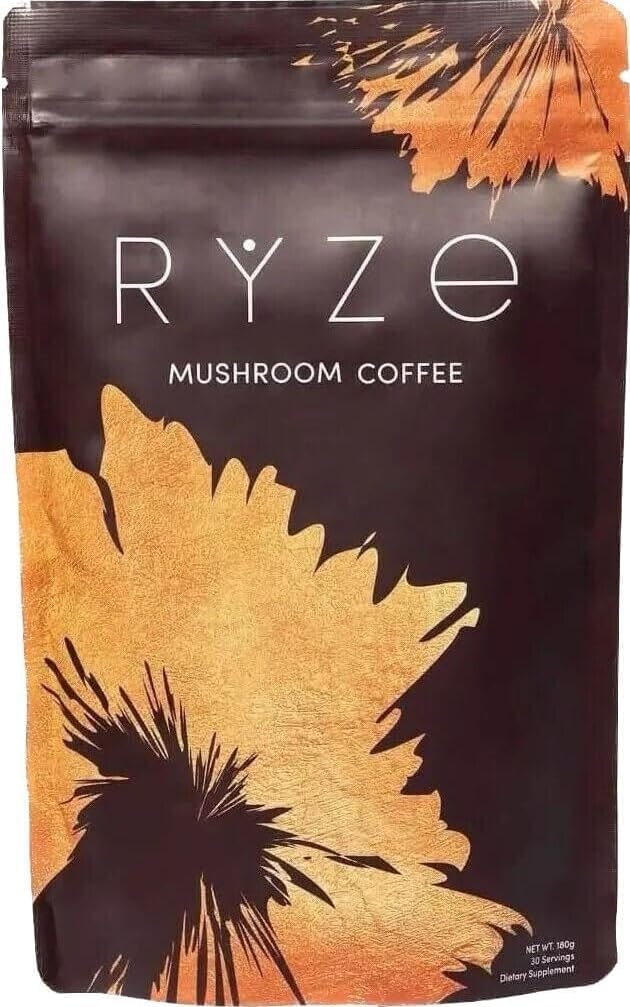
Photo by Innerbody Research
Pros
- 2g of full-spectrum mushrooms per serving
- Informative and friendly customer service
- Claims have some decent scientific support
- Certified USDA organic by California Certified Organic Farmers
- Mushrooms are grown in the United States
- Vegan-friendly ingredients
- Tastes the closest to traditional coffee
- Subscribe to save up to 25% off recurring monthly shipments
- Free shipping on all U.S. orders
- 30-day money-back guarantee
Cons
- Contains coconut ingredients, making it unsuitable for those with coconut allergies
- Though rare, shiitake can cause a transient rash in some people
- Mushroom blend is proprietary, with detailed amounts obscured
- Website can be frustrating to navigate
RYZE Mushroom Coffee is the flagship product of RYZE Superfoods, a Boston-based brand founded in 2020 by a duo of Harvard graduates aiming to improve the coffee-drinking experience by adding medicinal mushrooms to the mix. The makers claim the 2g proprietary mushroom blend can benefit “all aspects of health, mental and physical,” including your stamina, focus, immunity, longevity, mood, and gut health.
RYZE Mushroom Coffee ingredients and benefits
The original RYZE Mushroom Coffee contains a proprietary organic mushroom blend, organic instant arabica coffee, organic MCT oil, and organic coconut milk. It’s one of the shortest ingredient lists among our top picks (ReNude Chagaccino has the fewest inclusions overall).
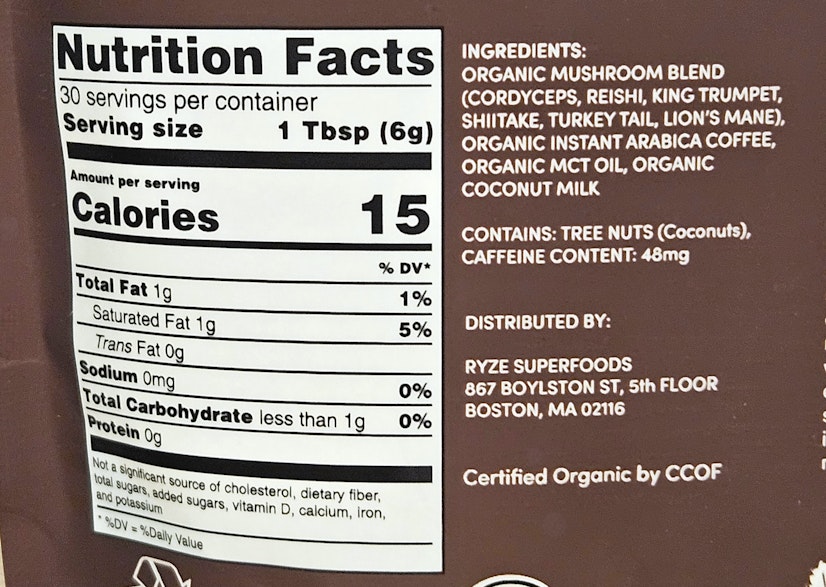
Photo by Innerbody Research
However, even though the ingredient list is short, RYZE contains the largest variety of mushrooms out of our picks, with the 2g blend consisting of cordyceps, reishi, king trumpet, shiitake, turkey tail, and lion’s mane mushrooms. RYZE claims the following benefits for each of them:
- Reishi: For mood
- Turkey tail: For gut health
- Shiitake: For immunity
- King trumpet: For longevity
- Cordyceps: For stamina
- Lion’s mane: For focus
While research on functional mushrooms (especially with large groups of human subjects) is still quite sparse, the current data on the mushrooms in RYZE’s blend is promising. We’ll give you some quick research details here, but we explore the matter further in our full RYZE review.
A 2012 study on reishi spore powder use in 48 breast cancer patients found that subjects reported less fatigue, depression, and anxiety.85
A 2015 study on healthy young adults found that daily consumption of 5-10g of shiitake mushrooms over four weeks resulted in improved immunity.88
A 2023 analysis of this mushroom notes that its polysaccharides may be useful as “functional food to potentiate the antioxidant defenses and to reduce oxidative stress.”8
A 2018 study found that both occasional and regular supplementation with cordyceps improved high-intensity exercise tolerance in a group of 28 adults.89
In a 2009 study, adult subjects with mild cognitive impairment were given lion’s mane in four 250mg (1,000mg total) tablets three times a day for four months. They saw increases in cognitive testing scores, which decreased again after treatment was discontinued.90 However, a more recent study in 2023 had mixed findings, suggesting the need for further research.91
The other potentially beneficial ingredient in RYZE Mushroom Coffee is MCT oil,92 which may promote weight loss and boost energy levels.93 94
Overall, RYZE isn’t far off with the suggested benefits of its mushrooms, but it’s important to keep in mind that (as with most functional mushroom research) many of the relevant studies had small sample sizes, were conducted on animals, or used doses greater than what’s likely — or possibly — in the proprietary blend. Based on the data that exists, though, you may still be able to see some of the benefits from a daily cup or two of RYZE Mushroom Coffee, even if they’re not as prominent.
Does RYZE use the mycelium or the fruiting body?
The answer to this isn’t made very clear on the RYZE website, so we reached out to customer service and asked. The response we received was impressively quick (within three hours), friendly, and informative:
“We don't include any undeclared ingredients or fillers. We do, however, grow our mushrooms on logs and whole-grain, gluten-free oats. You can have peace of mind knowing that we go through the process of separating the actual rooting of the mushrooms from the substrates they’re grown on. Additionally, we use full-spectrum mushrooms, including fruiting bodies, so you can get the maximum benefits from the whole mushroom’s life cycle.”
RYZE and MUD\WTR are our only picks that take advantage of their mushrooms’ full life cycles. Teeccino comes close by using the whole mushroom, but Everyday Dose, ReNude, and Four Sigmatic stick by the claim that using only the fruiting bodies is ideal.
Our RYZE experience
Besides a frustrating website design, our experience with RYZE was overall positive. Ordering was straightforward, shipping was fast, and the customer service was exceptional. When it came to trying the mushroom coffee itself, our testers found it mixed well with both hot and cold water, leaving little to no grainy texture behind. The Four Sigmatic Focus Latte, in comparison, required extra mixing throughout the drinking process to keep stubborn, unmixed powder from settling on the bottom of the mug.
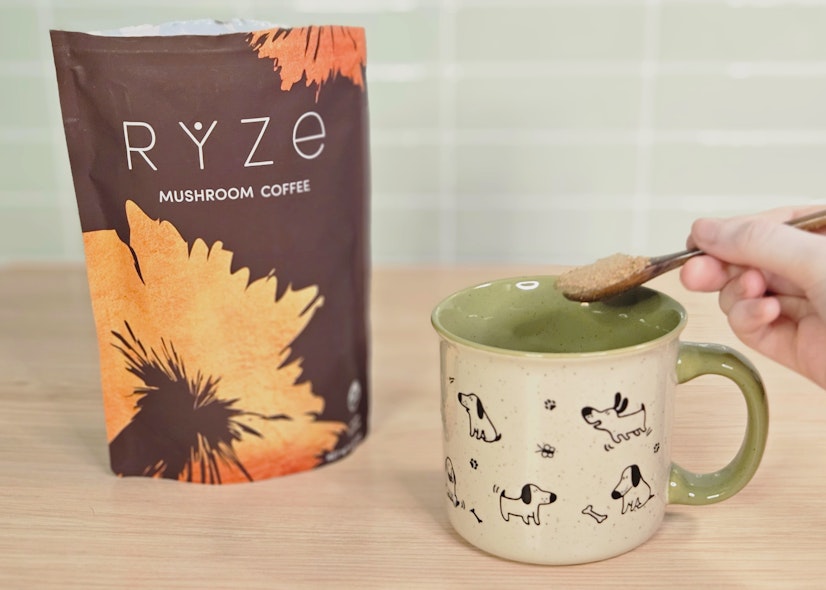
Photo by Innerbody Research
Taste-wise, RYZE Mushroom Coffee is a bit more “mushroomy” than our other top picks, but it was still considered “very smooth.” And a couple of our testers felt RYZE actually tasted the closest to traditional coffee out of our picks.
If you’re not a fan of an earthy or “weak coffee” flavor, we definitely recommend adding some sweetener or additional creamer of your choice. If you’re looking for something that doesn’t taste bitter at all, then an alternative like ReNude Chagaccino or Everyday Dose may be better for you.
Insider Tip: RYZE’s website can be difficult to navigate, and this frustration hasn’t improved since we first reviewed the company a couple of years ago. Opening the hamburger menu (the three lines in the upper-left corner of the website) on RYZE’s homepage won’t offer you easy access to all of the company’s products; the Try Now button just takes you to a small selection. Scrolling to the bottom of the page, under the FAQ but before the newsletter signup, you’ll find a small Shop On Demand link — this is where you’ll have to go to browse all of RYZE’s available products.
RYZE Mushroom Coffee pricing
Besides Teeccino, all of our top mushroom coffee picks are priced about the same: $45-$50 for a one-time purchase of a 30-day supply. But most of the companies also offer various bundles and subscription deals, and RYZE is no exception. The chart below covers the standard and subscription prices for RYZE products and bundles in which the main focus is the company’s original mushroom coffee. (Pricing details for RYZE’s other offerings can be found in our full review.)
| Includes: | Single purchase price | Subscription price | |
|---|---|---|---|
| Mushroom Coffee; 30 servings | 1 bag of mushroom coffee | $45 | $36 (20% off) |
| Mushroom Coffee; 90 servings | 3 bags of mushroom coffee | $115 | $90 (21.7% off) |
| RYZE Starter Kit; 60 servings | 2 bags of mushroom coffee, a spoon, a magnet, and a recipe booklet | $80 | $66 (17.5% off) |
| RYZE 'N Shine Bundle | 30 servings of both mushroom coffee and prebiotic creamer, plus a spoon | $72 | $60 (16.7% off) |
| Lasting Energy Bundle | 30 servings of both mushroom coffee and mushroom chicory | $80 | $66 (17.5% off) |
| Day + Night Bundle | 30 servings of mushroom coffee and 20 servings of hot chocolate | $80 | $66 (17.5% off) |
| Morning Ritual Bundle | 30 servings of mushroom coffee and 14 servings of mushroom overnight oats | $112 | $90 (19.6% off) |
| Ultimate Day + Night Bundle | 30 servings of mushroom coffee and matcha and 20 servings of hot chocolate | $108 | $81 (25% off) |
Something a bit frustrating about RYZE is the company’s inconsistent subscription discounts across products, which can also be rather strange amounts. For instance, with other brands, we rarely see subscription discounts of 16.7% off. In such cases, we feel it’d be better (as in, more appealing and less confusing to consumers) to just round it up to an even number.
That being said, RYZE’s subscription discounts are generally around the 20% mark and can reach up to 25%, which is a decent savings. In comparison, ReNude only gives you a 10% discount.
Like most of our picks (besides Teeccino), RYZE also offers a money-back guarantee. If you aren’t satisfied with your purchase, you can contact the company within 30 days to return your product and get a refund. Additionally, all orders to the contiguous United States ship for free.
Teeccino Mushroom Herbal Coffee
Best budget pick and best decaf
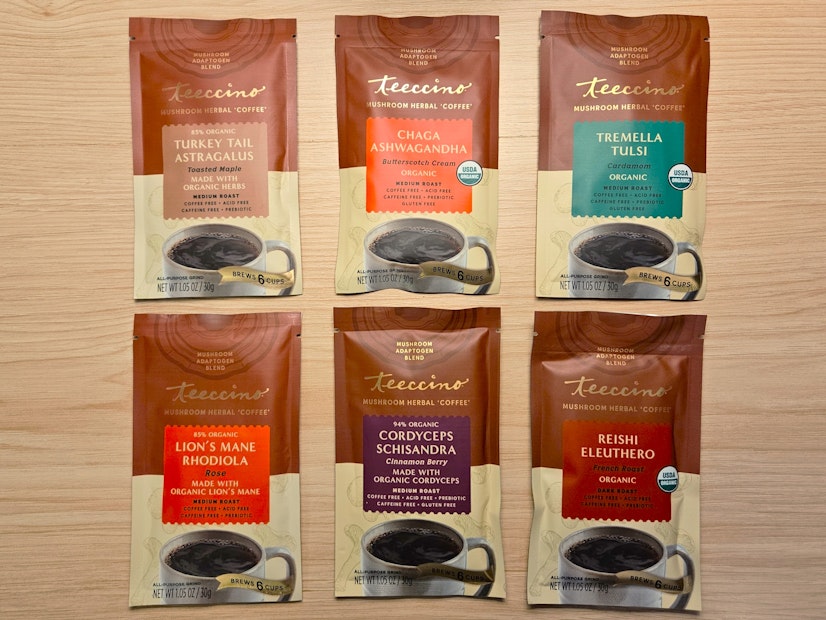
Photo by Innerbody Research
Pros
- Very low cost per serving
- Nearly all flavors contain 500mg whole mushroom per serving
- Chicory coffee tastes very similar to regular coffee but contains zero caffeine
- Wide variety of novel flavors (like maple, butterscotch, and cinnamon berry)
- Each flavor contains a well-dosed adaptogen
- Sample packs and trial sizes available to try flavors before committing
- Can be brewed like ground coffee or steeped like tea
- Subscriptions take 15% off
Cons
- Botanical ingredients may interact with medications or medical conditions
- Not safe for those allergic to tree nuts due to shared production machinery
- Gluten-free, kosher, and organic status varies by flavor
- Each flavor uses only one type of mushroom
- Brewing and steeping aren’t as convenient as typical instant mushroom coffee
Established in the 1990s by an award-winning tea designer, Teeccino is a brand dedicated to cost-effective “caffeine-free and acid-free” coffee alternatives. The company’s product collections include options based around dandelion, Mayan ramón seeds, Mediterranean flavors, and — of course — mushrooms. In addition to offering 500mg of mushroom extract and a good amount of an adaptogen per serving, Teeccino Mushroom Herbal Coffees come in novel flavors that you won’t find from competitors.
Teeccino Mushroom Herbal Coffee ingredients and benefits
Instead of traditional decaf coffee (which actually still contains a small amount of caffeine), all of the Teeccino Mushroom Herbal Coffees use a carob and chicory coffee blend.95
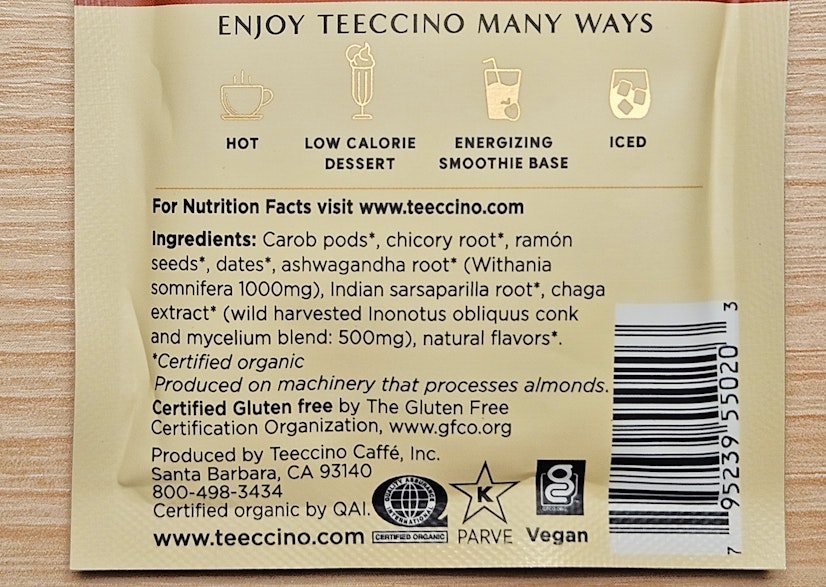
Photo by Innerbody Research
Chicory coffee is entirely caffeine-free and tastes nearly the same as regular coffee,96 97 while carob products are chocolatey in flavor and typically have up to around 0.085mg — or less than half of a single milligram — of caffeine at most.98 This exceptionally low caffeine content is why Teeccino earned our choice as the best decaf mushroom coffee option.
In terms of gluten-free status, not all of Teeccino’s flavors are certified as such. In the picture above, you may notice that the chaga variety states, “Certified Gluten Free by The Gluten Free Certification Organization,” but this isn’t the case for all flavors. For instance, the following picture shows the message seen on the Lion's Mane Rhodiola Rose option, which explains how — even though it’s not certified gluten-free — independent lab testing can’t detect gluten when these mushroom coffees are brewed using a paper filter or tea bag. Because of this, those who can’t have gluten may wish to consider using the tea bag varieties of Teeccino’s Mushroom Herbal Coffees instead of the grounds.
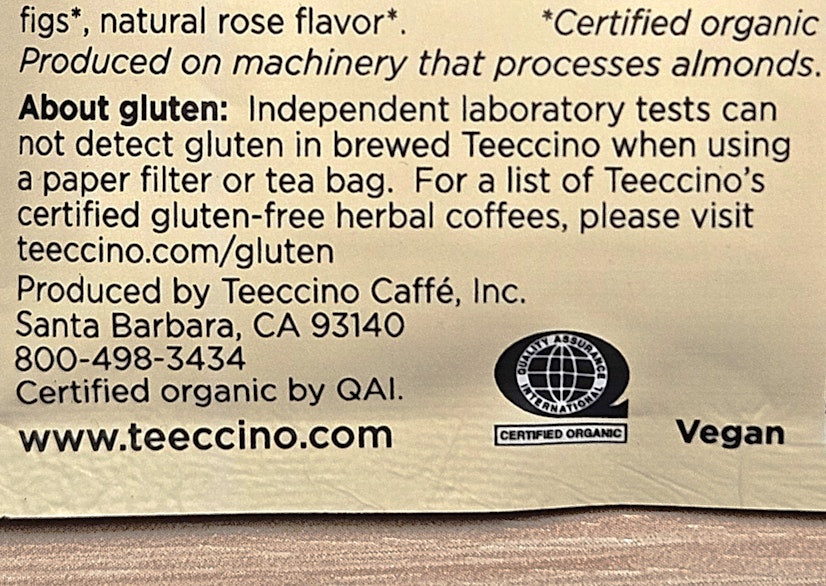
Photo by Innerbody Research
Now, when it comes to the different varieties of Teeccino’s Mushroom Herbal Coffee, each has its own set of ingredients. Every flavor focuses mainly on one mushroom and one adaptogen, but there are some other inclusions.
- Reishi Eleuthero French Roast: Carob pods, chicory root, barley, ramón seed, eleuthero root (1,000mg), reishi mushroom extract (500mg), and natural coffee flavor
- Chaga Ashwagandha Butterscotch Cream: Carob pods, chicory root, ramón seed, dates, ashwagandha root (1,000mg), Indian sarsaparilla root, chaga extract (500mg), and natural butterscotch cream flavor
- Lion's Mane Rhodiola Rose: Carob pods, chicory root, barley, dates, rose petals, Rhodiola root (500mg), lion’s mane extract (500mg), figs, and natural rose flavor
- Cordyceps Schisandra Cinnamon Berry: Carob pods, chicory root, cinnamon, ramón seed, Schisandra berries (600mg), sweet blackberry leaves, cordyceps extract (500mg), and natural blackberry flavor
- Turkey Tail Astragalus Toasted Maple: Carob pods, chicory root, barley, dates, astragalus root (1,000mg), turkey tail extract (500mg), natural toasted maple flavor, and figs
- Tremella Tulsi Cardamom: Carob pods, chicory root, Tulsi leaves (1,600mg), dandelion root, Tremella extract (500mg), cardamom seeds, and natural cardamom flavor
Similar to MUD\WTR and RYZE, Teeccino uses whole mushrooms — but as an extract — in all of its flavors except Tremella Tulsi Cardamom, which contains only the fruiting body. Tremella is also the only mushroom we haven’t covered anywhere else in this guide. Like the other mushrooms we’ve mentioned, studies on tremella have mainly been on cells and animals, but they may possess antioxidant, antitumor, antidiabetic, neuroprotective, and immunomodulatory properties. It might also promote better skin health via improved photoprotection and wound healing.99
That being said, Teeccino actually doesn’t make any “big” claims about the health benefits of its mushroom coffee. The company keeps things pretty simple by attributing the positives of its product to the well-established nutrition facts of the ingredients, including their antioxidant, prebiotic, potassium, and soluble fiber content. But even though no other claims are made, the adaptogens could provide some additional positives, like stress relief and better sleep or improved energy and immunity.25
Our experience with Teeccino
Teeccino's website is very easy to navigate. All of its products are readily available for browsing and are organized by base beverage, collection, dietary needs, taste, size, and more. Purchasing was straightforward, and, just like RYZE, our Teeccino order arrived exceptionally fast — only four days after our purchase. The company’s customer service was also very friendly, and the representatives answered our questions after a two-day waiting period. MUD\WTR’s team, in comparison, took over a week to get back to us, and their answers weren't all that helpful.
According to our testers, the Mushroom Herbal Coffee itself is smooth and has a rich, often mildly sweet flavor. Two of the varieties — Chaga Ashwagandha Butterscotch Cream and Turkey Tail Astragalus Maple — were tied for the favorite of the bunch. Teeccino’s mushroom coffees also have particularly nice aromas, which positively impact the overall experience of the flavors.
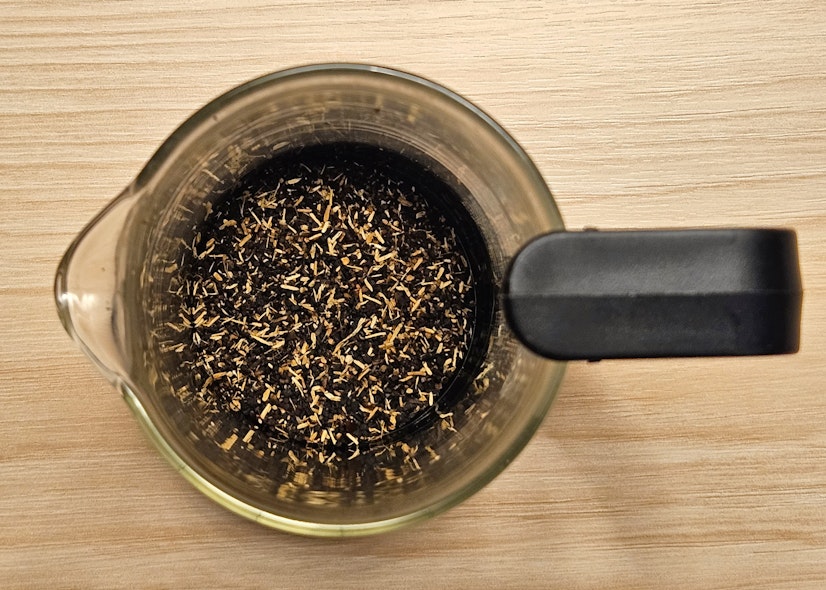
Photo by Innerbody Research
The only downside of Teeccino’s mushroom coffee is that it’s not instant; you’ll need to either brew it like typical ground coffee or steep a tea bag in hot water, depending on which form you purchase. All of our other picks are instant and simply require you to mix them in hot or cold water, or another beverage in the case of Chagaccino. We purchased the all-purpose grind sampler pack and made our Teeccino using a French press, but the company notes that you can use “any kind of coffee brewer” to make it, such as a Keurig, drip coffee maker, espresso machine, or Italian moka pot.
Teeccino Mushroom Coffee pricing
Besides being our selection for best decaf mushroom coffee, Teeccino also earned our choice as the best budget pick. You won’t get as much mushroom from these products as you would from alternatives like RYZE or MUD\WTR, but 500mg per serving at a low price is still impressive.
The chart below details Teeccino’s Mushroom Herbal Coffee pricing. All flavors cost the same, so we broke it down by product type. Also, only three of the flavors are available in the 5lb variety (Chaga Ashwagandha, Reishi Eleuthero, and Turkey Tail Astragalus), and you can’t currently subscribe to the Mushroom Coffee Sampler.
Insider Tip: The Mushroom Coffee Sampler and Mushroom Tea Sampler have the exact same ingredients. The only difference is that the former is ground coffee that requires brewing, while the latter is tea bags that need to be steeped. The “Tea” Sampler doesn’t use tea in place of the chicory and carob coffee blend despite the name — and the same applies to all of the tea bag options.
As you can see, even at its most expensive per serving — $0.80 when buying a 10-pack of tea bags — Teeccino offers a very affordable mushroom coffee. The next least expensive options from our other top picks are RYZE and Everyday Dose, which are tied at $1.50 per serving at standard cost. But even with subscription discounts, none of Teeccino’s close competitors come close in terms of cost.
Perhaps because it’s rather inexpensive, Teeccino doesn’t offer a money-back guarantee. If this is a dealbreaker for you, then you may prefer any of our other top picks, all of which have guarantees. Most of them are 30 days, but Everyday Dose and Four Sigmatic stand out with 45- and 120-day guarantees, respectively.
ReNude Chagaccino
Best tasting
Pros
- Caffeine-free, add-in style product is highly flexible
- Gluten-free, keto, non-GMO, and vegan-friendly ingredients
- Starter kit includes a frother, glass, metal straw, mushroom-shaped stress ball, and a pin
- Our testers’ favorite mushroom coffee for flavor
- Shipping is free on all orders
- 30-day money-back guarantee
- Subscribe to save 10% on recurring orders
Cons
- Costs just as much or more than products with far more mushroom content
- Only includes chaga fruiting bodies
- Sweeteners used may have an aftertaste (monk fruit) or cause a cooling sensation in the mouth (erythritol)
- Subscription discount is the lowest of our top picks
Founded in 2018 and based in Los Angeles, ReNude creates chaga-based mushroom coffee products. Its motto, “Live long, die pretty!” is reflected in the company's various claims about its flagship product, Chagaccino: Adaptogen Boost, such as its ability to fight aging, reduce stress, and prevent cell damage from free radicals. While we will be going over the validity of Chagaccino’s purported benefits, the main reason for this mushroom coffee being in this guide is its tasty, almost ice-cream-like flavor.
ReNude Chagaccino ingredients and benefits
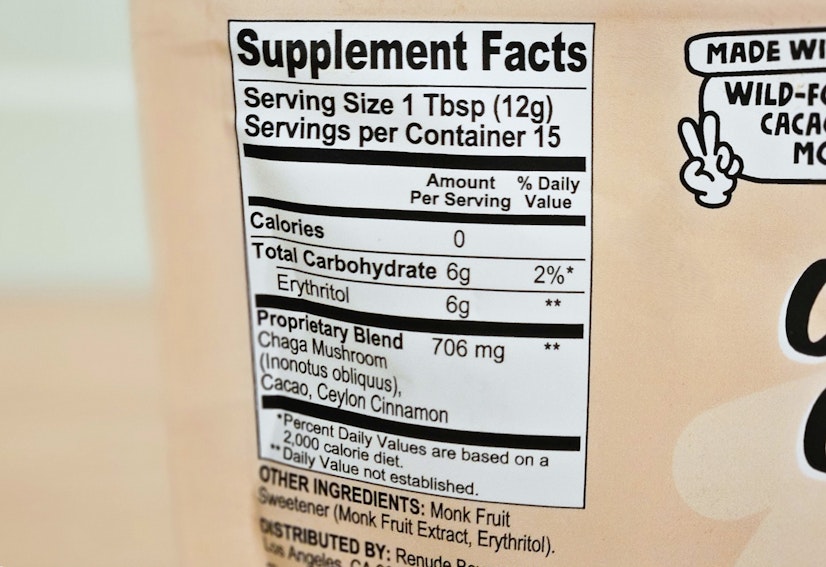
Photo by Innerbody Research
The original Chagaccino is the only one of our picks without a base beverage; there’s no coffee, tea, matcha, or anything else of the sort. Rather, it’s intended to be mixed in with your beverage of choice, meaning much of the resulting flavor is customizable to suit your tastes. Because of this, ReNude’s Chagaccino also has one of the smallest ingredient lists of our picks. Each serving contains:
- 706mg proprietary blend of chaga (500mg), cacao, and Ceylon cinnamon
- 6g of erythritol
- Undefined amount of monk fruit extract
Insider Tip: Due to the erythritol content, drinking Chagaccino may make your mouth feel cold, even if the drink is hot. This is a normal effect of the sweetener, but it can take some getting used to.24
In contrast to the fairly simple, nutrition-based benefit claims made by Teeccino for its Mushroom Herbal Coffee, ReNude’s suggestions for what Chagaccino can do for your health include:
- Providing the “highest natural source of antioxidants”
- Stress relief
- Immune support
- Anti-aging and beautifying effects
- Better energy and endurance
- Improved focus and cognitive function
- Gut health support
Now, let’s take a quick look at what the current science has to say about these claims.
Chaga has an exceptionally high oxygen radical absorbance capacity (ORAC) score.100 As licensed nutritionist Monica Reinagel explains, the ORAC score “measures the antioxidant activity of a food rather than the levels of specific nutrients, such as vitamin C or E.”101 This means that chaga demonstrates very high levels of antioxidant activity, which likely accounts for many of the other benefits ReNude claims for Chagaccino.
There really isn’t any evidence supporting chaga as a traditional stress reliever. The antioxidant content can help your body inhibit oxidative stress, but this isn’t the same as finding relief after feeling stressed out.14
ReNude claims consuming chaga “beautifies the pigment in your skin, eyes, and overall radiance” due to the mushroom’s high melanin content.14 Chaga’s antioxidant content and anti-inflammatory properties may reduce some of the signs of skin aging, but there are currently no proven (or safe) methods to increase the pigment in your skin or eyes — that’s all up to genetics, which a mushroom can’t alter.17
Some studies using animal models found that chaga may exhibit anti-fatigue effects. One study on mice used a “swimming-to-exhaustion” model and found that the group taking chaga was able to swim for “significantly longer” than the untreated group.15
And another mouse study showed that chaga supplementation increased the muscle volume, time before exhaustion during exercise, and glycogen storage in treated subjects.102 (Glycogen is a main source of energy for your body.)103
The antioxidant content in chaga mushrooms may help prevent chronic neurological conditions like Alzheimer’s disease and other forms of dementia by reducing oxidative stress.9 Additionally, a mouse study from 2011 found that chaga led to positive effects on the learning and memory capabilities of subjects with scopolamine-induced experimental amnesia.104
Ultimately, ReNude’s claims are fairly accurate, except for those about stress relief and beautifying. We would like to see the company tweak those two statements in the future so as not to mislead customers.
Additionally, unlike MUD\WTR, RYZE, and Teeccino, ReNude uses only fruiting bodies in its products, which — as we’ve mentioned — isn’t what we prefer to see companies do. After all, the left-out part of chaga mycelium may have anticancer properties and promote cytokine production,106 107 which could control inflammation.108
Our ReNude Chagaccino experience
Purchasing from ReNude is pretty straightforward; the website is user-friendly and easy enough to navigate. That being said, shipping from ReNude took the longest out of our top picks, at eight days from purchase to arrival. MUD\WTR was the next-slowest shipment (seven days), while RYZE and Teeccino were the fastest (four days).
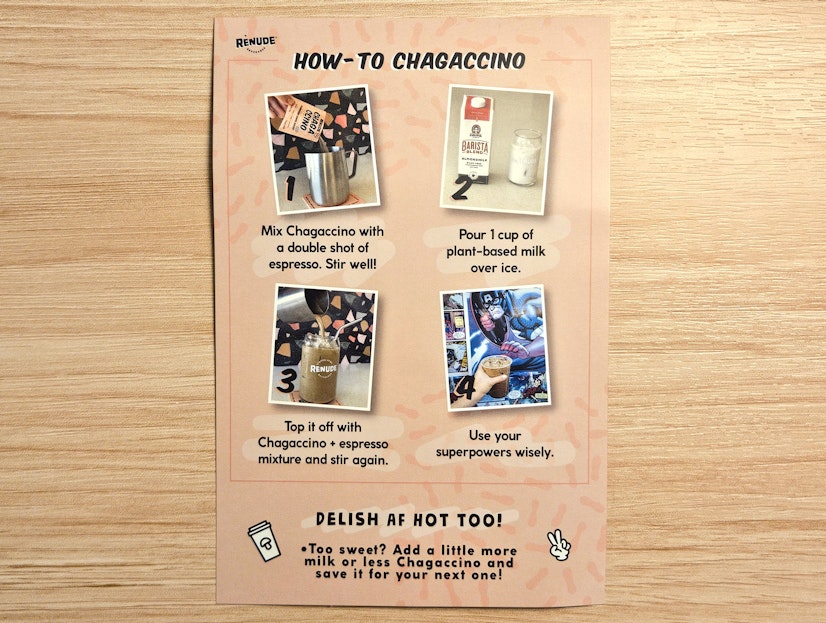
Photo by Innerbody Research
The Chagaccino product itself is also quite easy to use; you just add a tablespoon of powder to your drink of choice. (We recommend choosing something that pairs well with a chocolate flavor, as Chagaccino contains cacao.) When our testers followed the directions for making an actual Chagaccino, as written on the card included with our order, they found it tasted nearly identical to coffee ice cream. The slight aftertaste and cooling sensation of the sweeteners can take some getting used to, but they were far from dealbreakers for our testers.
ReNude Chagaccino pricing
While the Chagaccino product has a great flavor, its price may leave a bad taste in your mouth. For only 500mg of chaga fruiting bodies (not the whole mushroom), you’ll be paying anywhere from $30 to $50 for this mushroom coffee mix-in powder. Subscriptions can relieve some of the cost burden, but ReNude’s 10% off is the lowest discount of our top picks. Here’s how the prices break down:
| Standard price | Standard price per serving | Subscription price (10% off) | Subscription price per serving | |
|---|---|---|---|---|
| 10 single-serve packets | $29.99 | $3.00 | $26.99 | $2.70 |
| 15-serving bag | $34.99 | $2.33 | $31.49 | $2.10 |
| 30-serving refill bag | $44.99 | $1.50 | $40.49 | $1.35 |
| 30-serving canister | $49.99 | $1.67 | $44.99 | $1.50 |
One item not included in the chart is the Chagaccino gift box (ReNude’s version of a starter kit). This $50 box can’t be subscribed to, and it mainly includes branded and mushroom-themed gifts instead of actual Chagaccino powder (you only get ten single-serve packets of the product). The other gifts include a glass with ReNude branding on it, a milk frother, a rose gold straw, a button with “Live long, die pretty!” on it, and a mushroom-shaped stress ball (or, as the company puts it, a “shroom stress reliever squishy thing”).
On the plus side of Chagaccino’s pricing, shipping is free for all orders, and ReNude offers a 30-day money-back guarantee if you aren’t satisfied with your purchase. This guarantee is the same length as those from RYZE and MUD\WTR but shorter than the ones from Everyday Dose (45 days) and Four Sigmatic (120 days).
Everyday Dose Mushroom Coffee+
Best nootropics blend
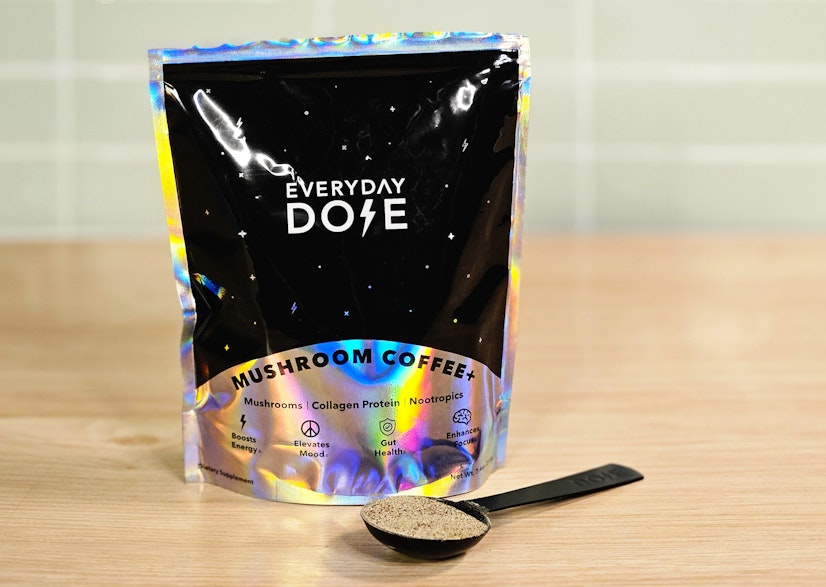
Photo by Innerbody Research
Pros
- Includes a nice variety of ingredients for additional brain and body support
- Standardized amount of beta-glucans (>15%)
- Friendly customer service
- L-Theanine can reduce or prevent jitteriness from caffeine
- 30-day starter kit includes a free rechargeable frother and a metal spoon
- Mushrooms are organic
- May be HSA/FSA eligible through Trumed
- 45-day money-back guarantee
- Shipping is free for U.S. orders
- Subscribe to save up to 40% and receive free monthly gifts
Cons
- Subscription cancellation requires waiting 20 days after initial purchase
- Mushroom blend is proprietary (and general amounts found in the FAQ are outdated)
- Using only fruiting bodies may limit benefits of mushrooms
- Bovine collagen makes the product unsuitable for vegans
Everyday Dose was founded in 2021 with the goal of providing an “alternative to regular coffee and stimulants” through the combination of functional mushrooms, amino acids, and nootropic ingredients. Everyday Dose claims its mushroom coffee can improve focus, mood, and energy, all while reducing stress levels.
Everyday Dose ingredients and benefits
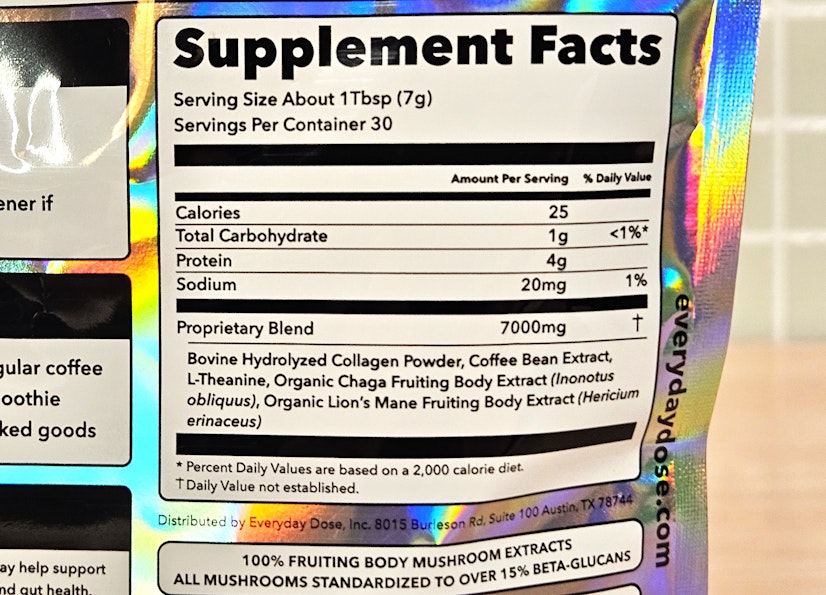
Photo by Innerbody Research
Unlike RYZE and Chagaccino, Everyday Dose contains a fairly large ingredient list, mainly due to the nearly 20 amino acids provided by the inclusion of bovine collagen. However, similar to many other mushroom coffees, Everyday Dose obscures its mushroom doses behind a proprietary blend. The 7,000mg (7g) blend doesn’t contain only mushrooms like the one in RYZE, though; it’s made up of:
- Bovine hydrolyzed collagen powder
- Coffee bean extract
- L-Theanine
- Organic chaga fruiting body extract
- Organic lion’s mane fruiting body extract
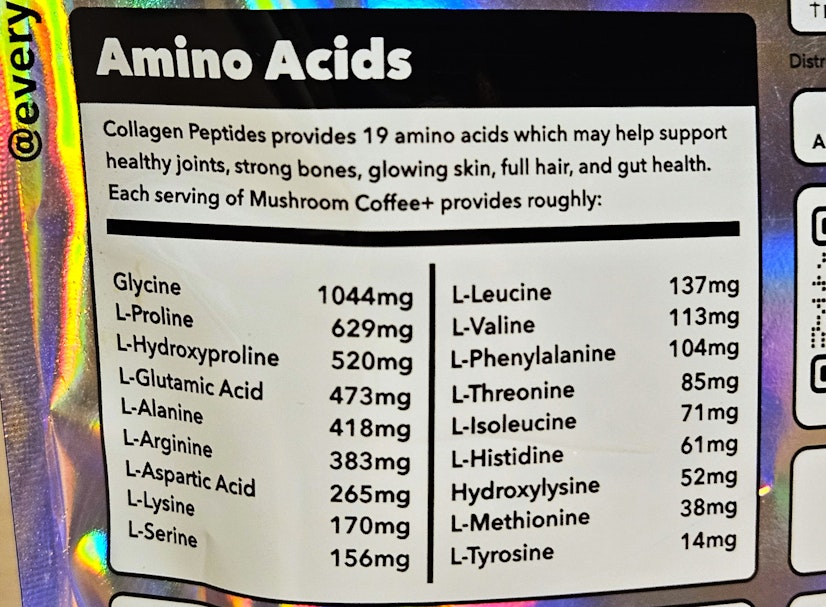
Photo by Innerbody Research
Normally, with proprietary blends, you’ll almost never be able to find out how much of an ingredient is present. But based on our interactions with customer service and the details we discovered ourselves, we determined that Everyday Dose contains about:
- 1,740mg of mushrooms; half chaga (870mg) and half lion’s mane (870mg), as explained by customer service
- 0.35mg of coffee extract or matcha
- 4,733mg of collagen, based on the collagen-derived amino acid content
- 150mg of L-theanine
Now let’s go over how the claims Everyday Dose makes for its product fare against current scientific research. We cover the most important parts in this guide, but our full Everyday Dose review goes into more detail.
To reiterate, Everyday Dose suggests its mushroom coffee can improve your focus, mood, and energy levels while simultaneously reducing stress. Additionally, the company notes potential benefits for hair, skin, joint, and nail health due to the bovine collagen content.
While they may not be the first thing you think of when you hear “nootropics” or “smart drugs,” amino acids do have some positive research behind them as cognition enhancers. For example, a 2020 study on 105 healthy older adults found that supplementation with seven essential amino acids over 12 weeks led to improvements in attention, cognitive flexibility, and psychosocial functioning.109 And some amino acids, like tyrosine, play a role in the production of certain neurotransmitters (serotonin) and catecholamines (dopamine, norepinephrine, and epinephrine).110
In terms of the mushrooms in Everyday Dose, lion’s mane has seen a mixed bag of results on cognition. Some studies have found positive effects,90 while others resulted in “null and limited negative findings.”91 Chaga studies involving cognition are more limited, but some animal studies have found encouraging results.104
Lion’s mane mushrooms demonstrated the potential to reduce feelings of depression and anxiety in a couple of studies. One study was on 30 women experiencing menopause symptoms, while the other involved 77 patients with overweight or obesity. The former study used fruiting body extract, but the latter used a mixture of 80% mycelium and 20% fruiting body extract.111 112
Additionally, multiple studies have shown that the combination of L-theanine and caffeine improves mood.113
The energy from Everyday Dose is most likely due to its caffeine content, but (as mentioned above) the combination of L-theanine and caffeine has demonstrated mood-boosting effects in studies, one of which is alertness.113
Unfortunately, there isn’t much high-quality evidence supporting the use of collagen for skin, hair, or nail health. Most studies that exist were either very small, were not placebo-controlled, or used supplements with multiple ingredients.114 When it comes to joint health, the preliminary data appears promising (particularly for hydrolyzed collagen), but more high-quality research is needed.115
More than anything else, the collagen in Everyday Dose’s mushroom coffee is beneficial for its amino acid content.
Similar to RYZE, Everyday Dose’s claims have some decent research to support them. The only claim that’s really lacking any evidence is collagen’s purported benefits for hair, skin, and nail health.
Does Everyday Dose use whole mushrooms or the fruiting body?
Everyday Dose is “committed” to using only the fruiting bodies of its mushrooms, which isn’t ideal based on what we know from existing research. The mycelium and other parts of the whole mushroom can boost the benefits of the fruiting body, or they may offer different advantages entirely.
Like many other mushroom coffee manufacturers, including Four Sigmatic and ReNude, Everyday Dose claims that the fruiting body is the only beneficial part of the mushroom and that companies using the mycelium or other mushroom parts are offering an inferior product in an effort to cut costs.
We feel that MUD\WTR, which uses the whole mushroom, puts it best on its website by stating that the mycelium “is currently on the end of a smear campaign.”
Our experience with Everyday Dose
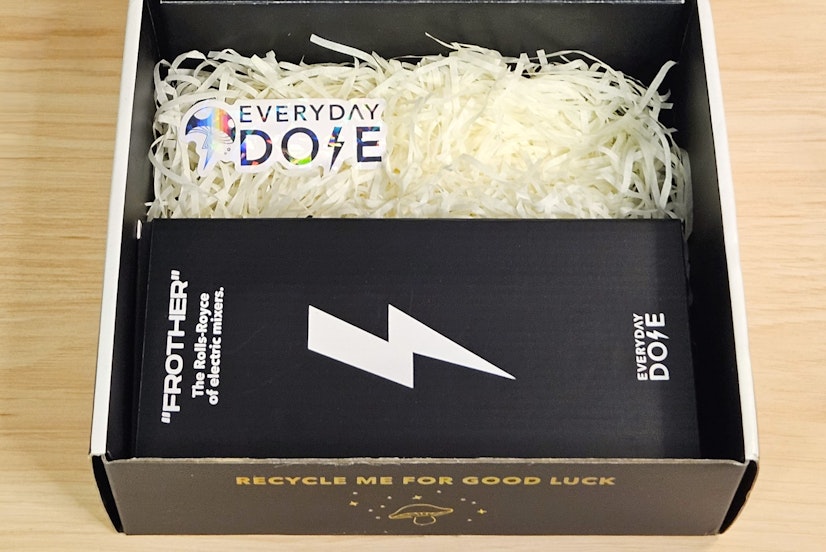
Photo by Innerbody Research
Our purchasing experience with Everyday Dose was smooth, and delivery took six days (the same time as our order from Four Sigmatic). However, our subscription experience with the company was a bit less than stellar. Everyday Dose is the only one of our picks that will make you wait a certain amount of time before you can cancel your subscription. The company policy notes that this should be 20 days after your order, but we ended up having to wait 22 before the cancel button would actually let us click on it. Not having a “cancel at any time” policy like the competition feels like a sneaky way to make customers forget to cancel and end up paying for another month.
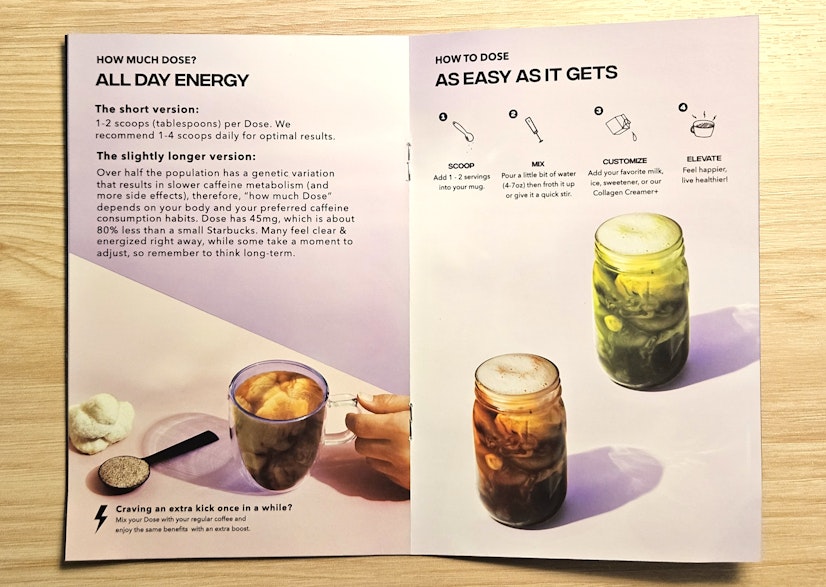
Photo by Innerbody Research
Other than our issues with the subscription, our team did enjoy Everyday Dose. The product mixes well and has a taste similar to extra-dark chocolate. Because of this, one of our testers found it paired perfectly with chocolate protein powder. We also found Everyday Dose’s frother to be much easier to use than MUD\WTR’s — the latter is a bit too powerful, leading to frequent spills and splashing.
Everyday Dose pricing
Everyday Dose’s mushroom coffee is available in four different ways — two are starter kits, and the other two are just bags of the powder. Here’s how the pricing works out:
| Standard price | Price per serving | Subscription price | Subscription price per serving | |
|---|---|---|---|---|
| 30-serving pouch | $45 | $1.50 | $36 (20% off) | $1.20 |
| 90-serving pouch | $110 | $1.22 | $99 (10% off) | $1.10 |
| 30-serving starter kit | $60 | $2.00 | $36 (40% off) | $1.20 |
| 60-serving starter kit | $80 | $1.33 | $55 (31% off) | $0.92 |
Like RYZE and Chagaccino, Everyday Dose ships free within the U.S., and your order is covered by a 45-day guarantee.
Interestingly, Everyday Dose is our only top pick that’s potentially eligible for payment via HSA/FSA. What makes this interesting is that supplements aren’t typically covered unless you have a letter from a physician stating that it’s necessary for the treatment of a diagnosed medical condition.116 The service that Everyday Dose uses for HSA/FSA, Trumed, claims it can help you get a letter of medical necessity, but we’re not sure what conditions could feasibly be treated with mushroom coffee. Ultimately, if you have an HSA/FSA, it could be worth a try, but we recommend tempering your expectations for approval from your account provider — especially since the IRS recently issued a warning about companies “misrepresenting nutrition, wellness, and general health expenses as medical care.”117
Four Sigmatic Focus Latte
Best adaptogen blend
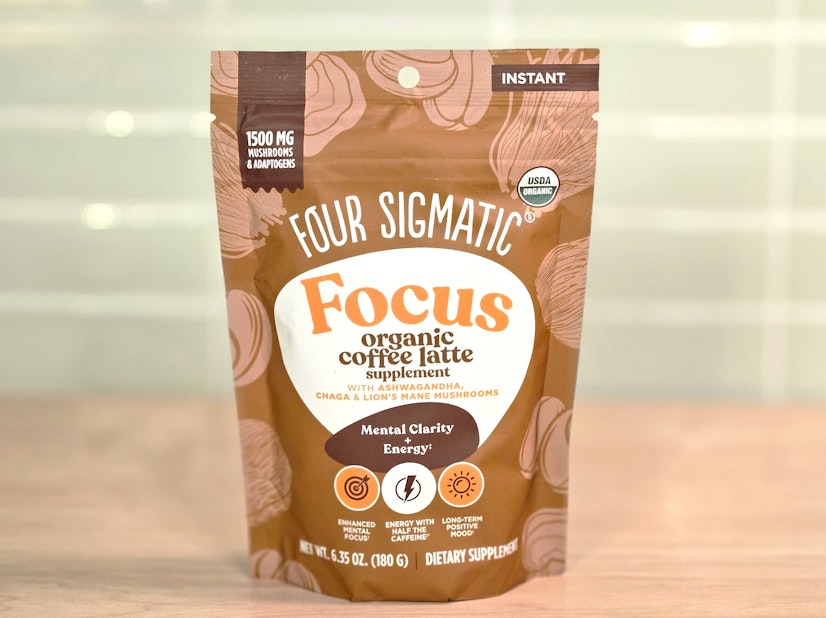
Photo by Innerbody Research
Pros
- Chaga and lion’s mane mushrooms have some supportive research for boosting focus
- Adaptogens, like Rhodiola, can promote focus and relaxation
- Inclusion of yacon may support gut health
- Important ingredient amounts are listed, not obscured like competitors
- USDA-certified organic
- Gluten-free and keto-friendly
- Often available in brick-and-mortar stores like Wegmans, Sprouts, and Whole Foods
- 120-day satisfaction guarantee
- Subscriptions take 20% off, and bulk purchases can reduce costs even further
Cons
- Contains coconut, making it unsafe for those with coconut allergies
- Leaves out potentially beneficial mycelium
- Botanicals may be unsafe for those on certain medications or with medical concerns
- Monk fruit can leave a slight aftertaste
Founded in 2012 as “a mental wellness and performance company,” Four Sigmatic is one of the more well-known brands on the market that specializes in functional mushroom products. In addition to mushroom coffees, Four Sigmatic offers mushroom- and plant-based protein powders, supplements, creamers, and more. But our choice for the best mushroom coffee adaptogen blend is Four Sigmatic’s Focus Latte, which contains a nice blend of functional mushrooms and botanicals.
Four Sigmatic Focus Latte ingredients
Four Sigmatic’s Focus Latte is gluten-free, keto-friendly, and USDA-certified organic. The ingredients in this mushroom coffee are:
- Organic chaga (500mg)
- Organic lion’s mane (500mg)
- Organic Rhodiola (250mg)
- Organic ashwagandha (125mg)
- Organic mucuna (125mg)
The additional inclusions not on the Supplement Facts are organic coconut milk powder, organic instant coffee powder, organic lucuma powder, organic yacon juice powder, and organic monk fruit extract.
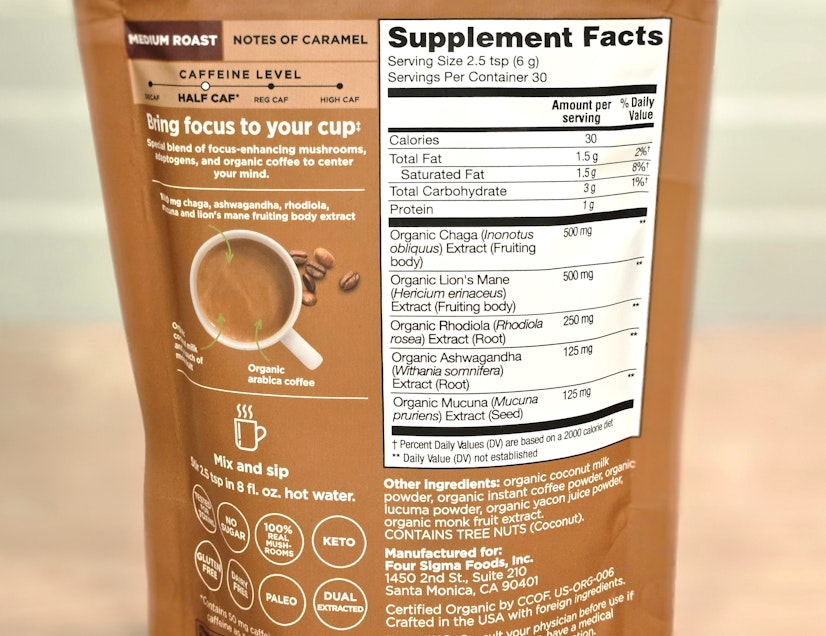
Photo by Innerbody Research
Similar to Teeccino, Four Sigmatic doesn’t make too many grand promises about its products, which is something we can appreciate. The company keeps it simple by saying the ingredients in its Focus Latte may boost your focus, energy, and mood. We also appreciate the product page that lists which ingredients the company attributes to each potential benefit. Interestingly, though, Four Sigmatic states that all of the mushrooms and botanicals can help with focus, while only the coffee boosts energy and mood. With there being several studies on adaptogens resulting in positive mood effects, we are a bit curious as to why only coffee is considered a mood booster.
Speaking of adaptogens and mood, ashwagandha,10 Rhodiola,118 and mucuna all have some supportive research suggesting they can reduce feelings of stress, anxiety, or depression.119 They also have some scientific support as cognitive enhancers.120 However, many of the cognition studies have been on animals.121
A somewhat successful study on ashwagandha did have human participants, though; it found that acute supplementation led to improvement in certain areas of executive function, attention, and short-term memory.122
Turning to the mushrooms, we think it’s a bit ironic that Four Sigmatic’s Focus Latte product page quotes an excerpt from Oprah Daily magazine stating that “Certain compounds in lion’s mane may stimulate the production of nerve growth factor (NGF).” While this potential benefit has been displayed in various studies, researchers have found that using both the fruiting body and the mycelium together — not just using the fruiting body, as Four Sigmatic does — appears to be ideal for promoting the production of NGF.41 In fact, erinacines, the NGF-stimulating compound found in lion’s mane mycelium, may be overall better at doing so than the compound in lion’s mane fruiting bodies (hericenones).123
Our experience with Four Sigmatic
As with our other top picks, ordering from Four Sigmatic was quick and simple, and our package arrived after six days. Focus Latte, however, was the only product we found not to dissolve very well. Our testers reported having to repeatedly mix their drinks in order to prevent undissolved powder from settling at the bottom. Adding additional liquid didn’t seem to fix the issue, either.
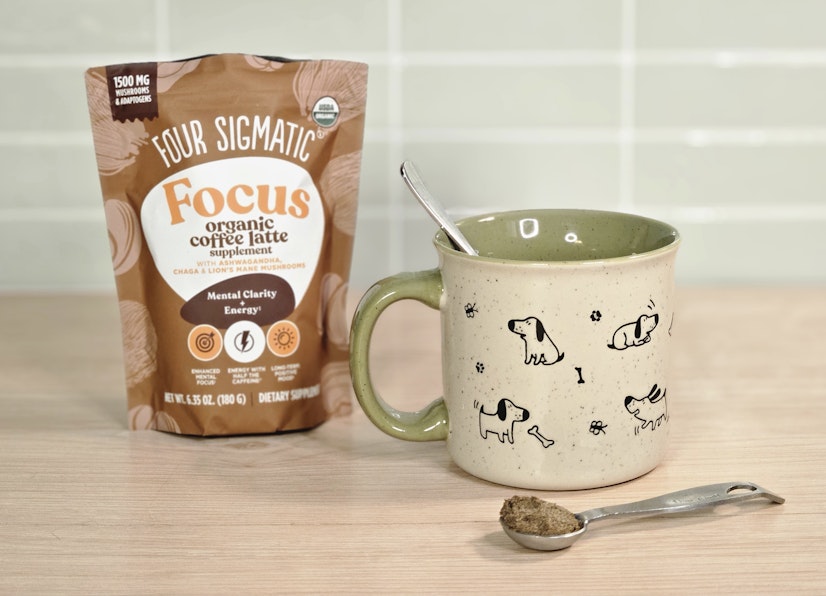
Photo by Innerbody Research
Taste-wise, Focus Latte is quite smooth (if you ignore the leftover powder) and creamy due to the added coconut milk. It has a slight hint of a caramel or vanilla flavor, which our testers found was enhanced when the product was served cold instead of hot.
Four Sigmatic Focus Latte pricing
Four Sigmatic offers subscription and bundling discounts for its Focus Latte, which can be combined for additional savings.
| Standard price | Subscription price (20% off) | Free shipping? | |
|---|---|---|---|
| One pack | $50 | $40 | |
| Two packs | $95 | $80 | |
| Four packs | $180 | $160 |
Only the two bulk options include free shipping; otherwise, it’s $7.95. And Four Sigmatic has the longest satisfaction guarantee of our top picks, giving you 120 days to try the product and decide if it’s right for you. To avoid the shipping fee on a single pack, you could bundle it with other purchases on Amazon, since the product is available there — or, if you’re a Prime member, you get free shipping on it regardless.
MUD\WTR Rest
Best evening blend
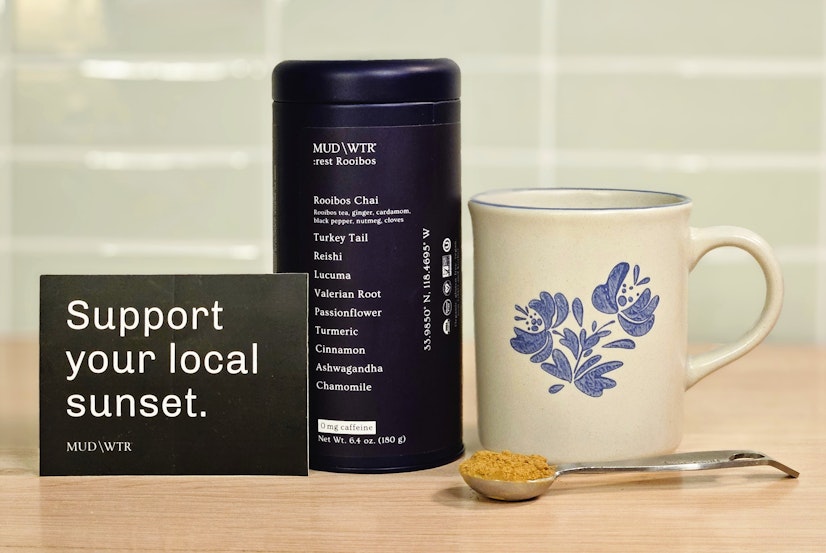
Photo by Innerbody Research
Pros
- Additional ingredients, like chamomile, can promote calm and better sleep
- Contains 2.24g of full-spectrum, whole mushrooms per serving
- Rooibos base brings some potential benefits of its own
- Starter kit comes with a rechargeable frother and a sample packet of creamer
- Organic, vegan, kosher, non-GMO, and gluten-free
- Caffeine- and sugar-free
- Detailed ingredient quantities can be found on the website despite proprietary blend
- Subscriptions take $10 off monthly refills
Cons
- Some ingredients, like turmeric, may interact with certain medications
- Customers frequently complain about getting less powder than they should be
- Spice flavor can be overpowering (especially if you aren’t a fan of spiced teas)
- Customer service needs some improvement
MUD\WTR was founded in 2018 with the goal of creating a coffee alternative that could provide energy, focus, and additional benefits without giving consumers jitters and anxiety. In addition to the original MUD\WTR, there’s also Matcha, Turmeric, and Rest, the last of which earned our pick as the best evening blend. In contrast to the original formula, Rest is not intended to give you energy and focus but rather relaxation and a sense of calm.
MUD\WTR Rest ingredients
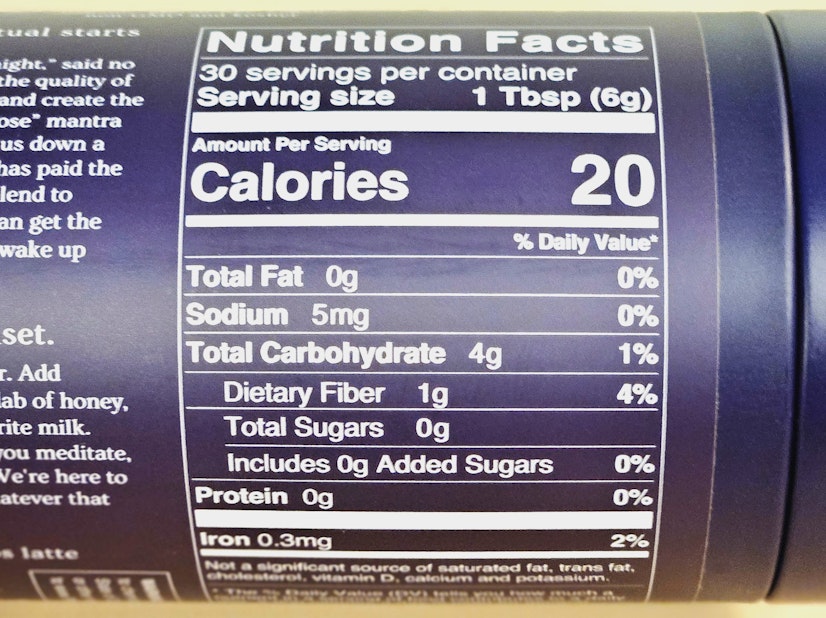
Photo by Innerbody Research
Just like RYZE, MUD\WTR uses full-spectrum, whole mushrooms that are allowed to complete their entire life cycle before harvest — this means you’re more likely to see benefits from the entire mushroom, including the mycelium. The mushrooms used in Rest are turkey tail and reishi, while the rest of the ingredients are botanicals, spices, and fruit powder. Here’s how the ingredients per serving break down:
- Rooibos tea (858mg)
- Valerian root (520mg)
- Passionflower (280mg)
- Cinnamon (200mg)
- Turkey tail (1,120mg)
- Ashwagandha (138mg)
- Reishi (1,120mg)
- Turmeric (260mg)
- Chamomile (96mg)
- Lucuma powder (1,100mg)
Based on existing research, the botanicals really stand out as the driving force behind the potential for Rest to promote relaxation.
- Ashwagandha has demonstrated the ability to reduce stress and anxiety in several studies. It also may be able to promote better sleep.10
- Some research on passionflower found it to work just as well in treating generalized anxiety disorder as the prescription drug Serax.11
- Perhaps due to the flavonoid apigenin, chamomile is “widely regarded” as a botanical with sleep-promoting properties.12
- In a 2023 study, valerian root “significantly improved” sleep quality and symptoms of anxiety and daytime sleepiness in young adults with insomnia.13
Additionally, the antioxidants found in many of the ingredients, like cinnamon, may also reduce stress and improve sleep quality.124 With all of this in mind, we feel that MUD\WTR’s relaxation claims have some solid footing.
Our MUD\WTR experience
MUD\WTR’s website design can be a little tricky to navigate at times; it’s not as bad as RYZE’s website, but there’s some room for improvement. However, the main issue we experienced was with customer support. We waited over a week to hear back from a representative, and their eventual answer to our question was less than helpful; it was more vague than anything.
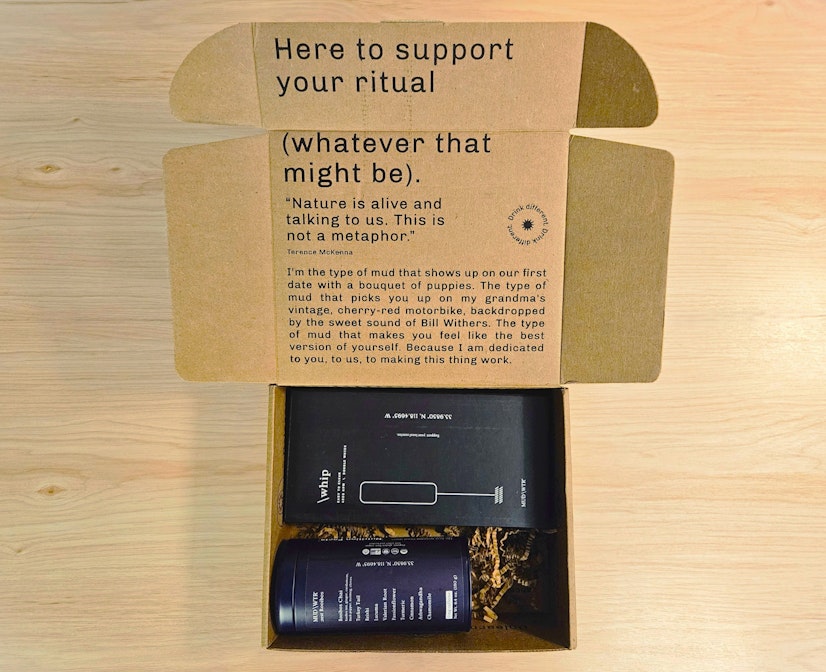
Photo by Innerbody Research
Other than that, purchasing from MUD\WTR isn’t inconvenient. Shipping took a week, but the product arrived safely, and we managed to avoid the all-too-common issue seen by many MUD\WTR customers — a distinct lack of product in the canister. In reviews, multiple customers mention not receiving a full canister of powder, but we’re happy to report this didn’t happen in our case.
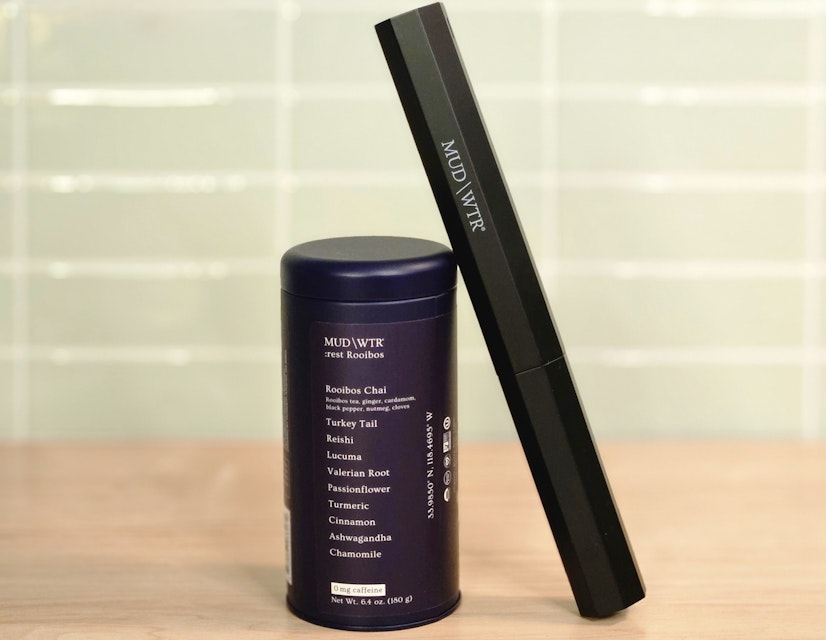
Photo by Innerbody Research
As for the flavor, Rest is a fairly strong, spicy tea — meaning spices, not the hot type of spicy. If you’re not a fan of strong spice and some bitterness, then, MUD\WTR Rest may be one to skip. Our testers did generally like the taste after modifying it with some half-and-half and coconut sugar, but they did note that it might not be everyone’s cup of tea (no pun intended).
One final aspect of our MUD\WTR experience that we feel is worth mentioning is how fast and powerful the frother (called the “MUD Whip”) is — and when you press the button to turn it on, the device runs continuously. These two factors mean that you may wind up with frequent spills, as we did. We definitely recommend keeping your eye on your mug when you use it.
MUD\WTR Rest pricing
There are four purchase options for MUD\WTR Rest, with one of them being a starter kit. Pricing details are as follows:
| Standard cost | Cost per serving | Subscription cost | Subscription cost per serving | |
|---|---|---|---|---|
| 30 servings | $50 | $1.67 | $40 | $1.33 |
| 90 servings | $125 | $1.39 | $100 | $1.11 |
| Latte kit (Rest + creamer) | $76.50 | $2.55 | $54 | $1.80 |
| Starter kit | $60 | $2.00 | $40 | $1.33 |
Standard shipping from MUD\WTR is $5.00, but subscriptions ship for free in the U.S. And when it comes to a money-back guarantee, MUD\WTR offers a pretty standard 30-day one (the same length as those from RYZE and ReNude).
Alternatives to mushroom coffee
If mushroom coffee doesn’t sound like it’s right for you, but you’re still searching for a product to boost your cognition or calm you down, then nootropics or other adaptogen supplements may be a better option.
Nootropics, or “smart drugs,” are supplements intended to boost your brain health in many aspects or a focused area of your choice. For example, our top nootropic pick, Thesis, offers different formulas depending on your specific needs. If you’re looking to stay awake after a sleepless night, then Thesis’ Energy formula may be ideal. Or, if you’re studying, you may want to try the Clarity option. More details on Thesis and other great nootropic options can be found in our guide to the best nootropics.
For those who are interested in the botanical ingredients in mushroom coffee, but less so in the actual mushroom coffee part of the equation, standalone botanical supplements could be a good alternative. Many botanical supplements, like ashwagandha, come in multiple forms for easy dosing, such as gummies, powders, and liquids.
If you’re in search of caffeine-based energy but also want the benefits of nootropics or adaptogens, certain energy drinks on the market are formulated with those desires in mind. Our choice for best budget nootropic, Focus Factor, sells a line of energy drinks and shots with various vitamins, minerals, and nootropic ingredients. And if you’re looking for adaptogens, Magic Mind is a matcha-based focus shot with botanicals, mushrooms, and amino acids.
Frequently asked questions about mushroom coffee
Sources
Innerbody uses only high-quality sources, including peer-reviewed studies, to support the facts within our articles. Read our editorial process to learn more about how we fact-check and keep our content accurate, reliable, and trustworthy.
USAFacts Team. (2023). How have Americans' drinking habits changed? USAFacts.
Allen, L. (2024). 2024 coffee statistics: Consumption, preferences, & spending. Drive Research.
Cleveland Clinic. (2023). This should perk you up: The surprising health benefits of coffee. Cleveland Clinic Health Essentials.
Yashin, A., Yashin, Y., Wang, J. Y., & Nemzer, B. (2013). Antioxidant and antiradical activity of coffee. Antioxidants, 2(4), 230-245.
U.S. Food and Drug Administration. (2024). Questions and answers on dietary supplements. FDA.
Łysakowska, P., Sobota, A., & Wirkijowska, A. (2023). Medicinal mushrooms: Their bioactive components, nutritional value and application in functional food production — a review. Molecules, 28(14).
Berger, R. G., Bordewick, S., Krahe, N., & Ersoy, F. (2022). Mycelium vs. fruiting bodies of edible fungi — a comparison of metabolites. Microorganisms, 10(7), 1379.
Petraglia, T., Latronico, T., Fanigliulo, A., Crescenzi, A., Liuzzi, G. M., & Rossano, R. (2023). Antioxidant activity of polysaccharides from the edible mushroom Pleurotus eryngii. Molecules, 28(5).
Cleveland Clinic. (2023). Oxidative stress. Cleveland Clinic.
National Institutes of Health, Office of Dietary Supplements. (2023). Ashwagandha: Is it helpful for stress, anxiety, or sleep? NIH.
Mount Sinai. (n.d.) Passionflower. Icahn School of Medicine at Mount Sinai.
Srivastava, J. K., Shankar, E., & Gupta, S. (2010). Chamomile: A herbal medicine of the past with a bright future. Molecular Medicine Reports, 3(6), 895.
Shekhar, H. C., Joshua, L., & Thomas, J. V. (2024). Standardized extract of valeriana officinalis improves overall sleep quality in human subjects with sleep complaints: A randomized, double-blind, placebo-controlled, clinical study. Advances in Therapy, 41(1), 246-261.
Alhallaf, W., & Perkins, L. B. (2022). The anti-inflammatory properties of chaga extracts obtained by different extraction methods against LPS-induced RAW 264.7. Molecules, 27(13).
Yon Ern, P. T., Quan, T. Y., Yee, F. S., & Yoke Yin, A. C. (2024). Therapeutic properties of Inonotus obliquus (Chaga mushroom): A review. Mycology, 15(2), 144-161.
Yang, X., Tang, C., Zhao, Q., Jia, Y., Qin, Y., & Zhang, J. (2023). Melanin: A promising source of functional food ingredient. Journal of Functional Foods, 105, 105574.
Fordjour, E., Manful, C. F., Javed, R., Galagedara, L. W., Cuss, C. W., Cheema, M., & Thomas, R. (2023). Chaga mushroom: A super-fungus with countless facets and untapped potential. Frontiers in Pharmacology, 14.
Park, J., Nguyet Nguyen, T. M., Thi Nguyen, M. T., Kim, J., & Park, T. (2023). Protective effects of lanostane triterpenoids from chaga mushroom in human keratinocytes, hacat cells, against inflammatory and oxidative stresses. International Journal of Molecular Sciences, 24(16).
U.S. Food and Drug Administration. (2022). FDA 101: Dietary supplements. FDA.
U.S. Department of the Interior, National Park Service. (n.d.). Mushrooms and other fungi. NPS.
CK-12 Foundation. (n.d.). How fungi eat. LibreTexts Biology.
Orywal, K., Socha, K., Nowakowski, P., Zoń, W., Kaczyński, P., Mroczko, B., Łozowicka, B., & Perkowski, M. (2021). Health risk assessment of exposure to toxic elements resulting from consumption of dried wild-grown mushrooms available for sale. PLoS ONE, 16(6).
Salamah Ab Rhaman, S. M., Naher, L., & Siddiquee, S. (2022). Mushroom quality related with various substrates’ bioaccumulation and translocation of heavy metals. Journal of Fungi, 8(1).
Mazi, T. A., & Stanhope, K. L. (2023). Erythritol: An in-depth discussion of its potential to be a beneficial dietary component. Nutrients, 15(1).
Cleveland Clinic. (2023). Adaptogens. Cleveland Clinic.
Venturella, G., Ferraro, V., Cirlincione, F., & Gargano, M. L. (2021). Medicinal mushrooms: Bioactive compounds, use, and clinical trials. International Journal of Molecular Sciences, 22(2).
The American College of Obstetricians and Gynecologists. (2020). How much coffee can I drink while I'm pregnant? ACOG.
Singh, A., Garg, S., & Kumar Upadhyay, A. (2023). Identification and analysis of allergens in edible mushroom (Agaricus bisporus). Materials Today: Proceedings.
Hegde, V. L., Das, J. R., & Venkatesh, Y. P. (2002). Anaphylaxis caused by the ingestion of cultivated mushroom (Agaricus bisporus): Identification of allergen as mannitol. Allergology International, 51(2), 121-129.
Ito, T., Kobayashi, T., Egusa, C., Maeda, T., Abe, N., Okubo, Y., Tsuboi, R., & Niitsuma, T. (2020). A case of food allergy due to three different mushroom species. Allergology International, 69(1), 152-153.
National Library of Medicine. (2022). Reishi mushroom. MedlinePlus.
Mirończuk-Chodakowska, I., Kujawowicz, K., & Witkowska, A. M. (2021). Beta-glucans from fungi: Biological and health-promoting potential in the COVID-19 pandemic era. Nutrients, 13(11).
Cerletti, C., Esposito, S., & Iacoviello, L. (2021). Edible mushrooms and beta-glucans: impact on human health. Nutrients, 13(7).
Chugh, R. M., Mittal, P., MP, N., Arora, T., Bhattacharya, T., Chopra, H., Cavalu, S., & Gautam, R. K. (2022). Fungal mushrooms: A natural compound with therapeutic applications. Frontiers in Pharmacology, 13.
Li, L., Meng, H., & Yi, F. (2018). A preliminary review of studies on adaptogens: Comparison of their bioactivity in TCM with that of ginseng-like herbs used worldwide. Chinese Medicine, 13.
Cleveland Clinic. (2024). Hypothalamic-pituitary-adrenal (HPA) axis. Cleveland Clinic.
Kochman, J., Jakubczyk, K., Antoniewicz, J., Mruk, H., & Janda, K. (2021). Health benefits and chemical composition of matcha green tea: A review. Molecules, 26(1).
Haskell, C. F., Kennedy, D. O., Milne, A. L., Wesnes, K. A., & Scholey, A. B. (2008). The effects of L-theanine, caffeine and their combination on cognition and mood. Biological Psychology, 77(2), 113-122.
Sohail, A. A., Ortiz, F., Varghese, T., Fabara, S. P., Batth, A. S., Sandesara, D. P., Sabir, A., Khurana, M., Datta, S., & Patel, U. K. (2021). The cognitive-enhancing outcomes of caffeine and L-theanine: A systematic review. Cureus, 13(12).
Ratan, Z. A., Haidere, M. F., Hong, Y. H., Park, S. H., Lee, J., Lee, J., & Cho, J. Y. (2021). Pharmacological potential of ginseng and its major component ginsenosides. Journal of Ginseng Research, 45(2), 199-210.
Shen, J., Yu, H., Wu, T., & Zhao, X. (2009). Hericenones and erinacines: Stimulators of nerve growth factor (NGF) biosynthesis in Hericium erinaceus. An International Journal on Fungal Biology, 1(2), 92-98.
Barker, P. A., Mantyh, P., Arendt-Nielsen, L., Viktrup, L., & Tive, L. (2020). Nerve growth factor signaling and its contribution to pain. Journal of Pain Research, 13, 1223-1241.
Wong, K. H., Kanagasabapathy, G., Naidu, M., David, P., & Sabaratnam, V. (2016). Hericium erinaceus (Bull.: Fr.) Pers., a medicinal mushroom, activates peripheral nerve regeneration. Chinese Journal of Integrative Medicine, 22(10), 759-767.
Abdullah, N., Ismail, S. M., Aminudin, N., Shuib, A. S., & Lau, B. F. (2012). Evaluation of selected culinary-medicinal mushrooms for antioxidant and ACE inhibitory activities. Evidence-Based Complementary and Alternative Medicine: ECAM, 2012.
Wang, G., Zhang, X., Maier, S. E., Zhang, L., & Maier, R. J. (2019). In vitro and in vivo inhibition of Helicobacter pylori by ethanolic extracts of lion's mane medicinal mushroom, Hericium erinaceus (Agaricomycetes). International Journal of Medicinal Mushrooms, 21(1), 1–11.
Wang, X., & Lin, Z. (2019). Immunomodulating effect of Ganoderma (Lingzhi) and possible mechanism. Advances in Experimental Medicine and Biology, 1182, 1-37.
Memorial Sloan Kettering Cancer Center. (2023). Reishi mushroom. MSKCC.
Jin, X., Beguerie, J. R., & Chan, G. C. (2016). Ganoderma lucidum (Reishi mushroom) for cancer treatment. The Cochrane Database of Systematic Reviews, 2016(4).
Saha, T. K., Rahman, T., Moniruzzaman, M., Min, T., & Hossain, Z. (2023). Immuno-physiological effects of dietary reishi mushroom powder as a source of beta-glucan on Rohu, Labeo rohita challenged with Aeromonas veronii. Scientific Reports, 13.
Wachtel-Galor, S., Tomlinson, B., & Benzie, I. F. (2004). Ganoderma lucidum ("Lingzhi"), a Chinese medicinal mushroom: Biomarker responses in a controlled human supplementation study. The British Journal of Nutrition, 91(2), 263-269.
Kim, R. (2005). Immunomodulatory activity of the water extract from medicinal mushroom Inonotus obliquus. Mycobiology, 33(3), 158-162.
Arata, S., Watanabe, J., Maeda, M., Yamamoto, M., Matsuhashi, H., Mochizuki, M., Kagami, N., Honda, K., & Inagaki, M. (2016). Continuous intake of the chaga mushroom (Inonotus obliquus) aqueous extract suppresses cancer progression and maintains body temperature in mice. Heliyon, 2(5).
Youn, J., Kim, K., Park, Y., Kim, Y., Kim, J., Lee, J. S., Chai, K. Y., Kim, J., Cui, X., So, H. S., Kim, Y., & Park, R. (2008). Chaga mushroom (Inonotus obliquus) induces G0/G1 arrest and apoptosis in human hepatoma HepG2 cells. World Journal of Gastroenterology: WJG, 14(4), 511-517.
Utah State University. (n.d.). Caterpillar fungus. USU.
Chen, S., Li, Z., Krochmal, R., Abrazado, M., Kim, W., & Cooper, C. B. (2010). Effect of Cs-4® (Cordyceps sinensis) on exercise performance in healthy older subjects: A double-blind, placebo-controlled trial. Journal of Alternative and Complementary Medicine, 16(5), 585-590.
Liu, Y., Wang, J., Wang, W., Zhang, H., Zhang, X., & Han, C. (2015). The chemical constituents and pharmacological actions of Cordyceps sinensis. Evidence-Based Complementary and Alternative Medicine: ECAM, 2015.
Zhao, C. S., Yin, W. T., Wang, J. Y., Zhang, Y., Yu, H., Cooper, R., Smidt, C., & Zhu, J. S. (2002). CordyMax Cs-4 improves glucose metabolism and increases insulin sensitivity in normal rats. Journal of Alternative and Complementary Medicine (New York, N.Y.), 8(3), 309-314.
Kała, K., Kryczyk-Poprawa, A., Rzewińska, A., & Muszyńska, B. (2020). Fruiting bodies of selected edible mushrooms as a potential source of lovastatin. European Food Research and Technology, 246, 713-722.
Duong, H., & Bajaj, T. (2023). Lovastatin. StatPearls Publishing.
Yu, S., Wu, X., Ferguson, M., Simmen, R. C., Cleves, M. A., Simmen, F. A., & Fang, N. (2016). Diets containing shiitake mushroom reduce serum lipids and serum lipophilic antioxidant capacity in rats. The Journal of Nutrition, 146(12), 2491-2496.
Vetvicka, V., & Vetvickova, J. (2014). Immune-enhancing effects of maitake (Grifola frondosa) and shiitake (Lentinula edodes) extracts. Annals of Translational Medicine, 2(2).
Memorial Sloan Kettering Cancer Center. (2024). AHCC. MSKCC.
Vetter, J. (2023). The mushroom glucans: Molecules of high biological and medicinal importance. Foods, 12(5).
Zhong, L., Yan, P., Lam, W. C., Yao, L., & Bian, Z. (2019). Coriolus versicolor and Ganoderma lucidum related natural products as an adjunct therapy for cancers: A systematic review and meta-analysis of randomized controlled trials. Frontiers in Pharmacology, 10.
Kıvrak, I., Kivrak, S., & Karababa, E. (2020). Assessment of bioactive compounds and antioxidant activity of turkey tail medicinal mushroom Trametes versicolor (Agaricomycetes). International Journal of Medicinal Mushrooms, 22(6), 559–571.
Benson, K. F., Stamets, P., Davis, R., Nally, R., Taylor, A., Slater, S., & Jensen, G. S. (2019). The mycelium of the Trametes versicolor (turkey tail) mushroom and its fermented substrate each show potent and complementary immune activating properties in vitro. BMC Complementary and Alternative Medicine, 19.
Liang, B., Guo, Z., Xie, F., & Zhao, A. (2013). Antihyperglycemic and antihyperlipidemic activities of aqueous extract of Hericium erinaceus in experimental diabetic rats. BMC Complementary and Alternative Medicine, 13, 253.
Mori, K., Kikuchi, H., Obara, Y., Iwashita, M., Azumi, Y., Kinugasa, S., Inatomi, S., Oshima, Y., & Nakahata, N. (2010). Inhibitory effect of hericenone B from Hericium erinaceus on collagen-induced platelet aggregation. Phytomedicine, 17(14), 1082-1085.
Winder, M., Bulska-Będkowska, W., & Chudek, J. (2021). The use of Hericium erinaceus and Trametes versicolor extracts in supportive treatment in oncology. Acta Pharmaceutica (Zagreb, Croatia), 71(1), 1-16.
Kwon, O., Kim, Y., Paek, J. H., Park, W. Y., Han, S., Sin, H., & Jin, K. (2022). Chaga mushroom-induced oxalate nephropathy that clinically manifested as nephrotic syndrome: A case report. Medicine, 101(10).
Lee, S., Lee, H. Y., Park, Y., Ko, E. J., Ban, T. H., Chung, B. H., Lee, H. S., & Yang, C. W. (2020). Development of end stage renal disease after long-term ingestion of chaga mushroom: Case report and review of literature. Journal of Korean Medical Science, 35(19).
Memorial Sloan Kettering Cancer Center. (2022). Cordyceps. MSKCC.
Hatton, M. N., Desai, K., Le, D., & Vu, A. (2018). Excessive postextraction bleeding associated with Cordyceps sinensis: A case report and review of select traditional medicines used by Vietnamese people living in the United States. Oral Surgery, Oral Medicine, Oral Pathology and Oral Radiology, 126(6), 494-500.
Cleveland Clinic. (2023). Cordyceps is a killer fungi with potential health benefits. Cleveland Clinic Health Essentials.
Trowbridge, E., Thomas, L., & Oakley, A. (2016). Shiitake flagellate dermatitis. DermNet.
Regazzi Avelleira, J. C., Nishimori, F. S., & Cassia, F. (2015). Shiitake dermatitis. Anais Brasileiros de Dermatologia, 90(2), 276-278.
Maruthappu, T., & Hader, Z. (2021). A characteristic rash caused by shiitake mushrooms — an emerging concern? Clinical Case Reports, 9(6).
Chu, E. Y., Anand, D., Dawn, A., Elenitsas, R., & Adler, D. J. (2013). Shiitake dermatitis: A report of 3 cases and review of the literature. Cutis, 91(6), 287-290.
TRC Healthcare. (n.d.). Shiitake mushroom. Susan G. Komen.
Memorial Sloan Kettering Cancer Center. (2023). Shiitake mushroom. MSKCC.
Lam, C. S., Cheng, L. P., Zhou, L. M., Cheung, Y. T., & Zuo, Z. (2020). Herb–drug interactions between the medicinal mushrooms Lingzhi and Yunzhi and cytotoxic anticancer drugs: A systematic review. Chinese Medicine, 15.
Guggenheim, A. G., Wright, K. M., & Zwickey, H. L. (2014). Immune modulation from five major mushrooms: Application to integrative oncology. Integrative Medicine: A Clinician's Journal, 13(1), 32-44.
National Library of Medicine. (2024). Ashwagandha. MedlinePlus.
Shane-McWhorter, L. (2023). Rhodiola. Merck Manual Professional Version.
Zhao, H., Zhang, Q., Zhao, L., Huang, X., Wang, J., & Kang, X. (2012). Spore powder of Ganoderma lucidum improves cancer-related fatigue in breast cancer patients undergoing endocrine therapy: A Pilot clinical trial. Evidence-Based Complementary and Alternative Medicine: ECAM, 2012.
Jayachandran, M., Xiao, J., & Xu, B. (2017). A critical review on health promoting benefits of edible mushrooms through gut microbiota. International Journal of Molecular Sciences, 18(9), 1934.
Saleh, M. H., Rashedi, I., & Keating, A. (2017). Immunomodulatory properties of Coriolus versicolor: The role of polysaccharopeptide. Frontiers in Immunology, 8, 283512.
Dai, X., Stanilka, J. M., Rowe, C. A., Esteves, E. A., Nieves, C., Jr, Spaiser, S. J., Christman, M. C., Langkamp-Henken, B., & Percival, S. S. (2015). Consuming Lentinula edodes (shiitake) mushrooms daily improves human immunity: A randomized dietary intervention in healthy young adults. Journal of the American College of Nutrition, 34(6), 478-487.
Hirsch, K. R., Smith-Ryan, A. E., Roelofs, E. J., Trexler, E. T., & Mock, M. G. (2017). Cordyceps militaris improves tolerance to high intensity exercise after acute and chronic supplementation. Journal of Dietary Supplements, 14(1), 42.
Mori, K., Inatomi, S., Ouchi, K., Azumi, Y., & Tuchida, T. (2009). Improving effects of the mushroom yamabushitake (Hericium erinaceus) on mild cognitive impairment: A double-blind placebo-controlled clinical trial. Phytotherapy Research, 23(3), 367-372.
Docherty, S., Doughty, F. L., & Smith, E. F. (2023). The acute and chronic effects of lion’s mane mushroom supplementation on cognitive function, stress and mood in young adults: A double-blind, parallel groups, pilot study. Nutrients, 15(22).
Cleveland Clinic. (2022). Is MCT oil worth the hype? Cleveland Clinic Health Essentials.
St-Onge, P., Mayrsohn, B., Kissileff, H. R., Choudhury, A. R., & Laferrère, B. (2014). Impact of medium and long chain triglycerides consumption on appetite and food intake in overweight men. European Journal of Clinical Nutrition, 68(10), 1134.
Duranova, H., Kuzelova, L., Fialkova, V., Simora, V., Kovacikova, E., Joanidis, P., Borotova, P., Straka, D., Hoskin, R. T., Moncada, M., de Medeiros, F., & Gabriny, L. (2024). Coconut-sourced MCT oil: Its potential health benefits beyond traditional coconut oil. Phytochemistry Reviews (2024).
NCA. (n.d.). Get the facts about decaffeinated coffee. National Coffee Association of U.S.A., Inc.
Puhlmann, L. (2020). Back to the roots: Revisiting the use of the fiber-rich Cichorium intybus L. taproots. Advances in Nutrition, 11(4), 878-889.
Petronilho, S., Navega, J., Pereira, C., Almeida, A., Siopa, J., Nunes, F. M., Coimbra, M. A., & Passos, C. P. (2023). Bioactive properties of instant chicory melanoidins and their relevance as health promoting food ingredients. Foods, 12(1).
Papaefstathiou, E., Agapiou, A., Giannopoulos, S., & Kokkinofta, R. (2018). Nutritional characterization of carobs and traditional carob products. Food Science & Nutrition, 6(8), 2151-2161.
Mineroff, J., & Jagdeo, J. (2023). The potential cutaneous benefits of Tremella fuciformis. Archives of Dermatological Research, 315(7), 1883–1886.
Sharpe, E., Farragher-Gnadt, A. P., Igbanugo, M., Huber, T., Michelotti, J. C., Milenkowic, A., Ludlam, S., Walker, M., Hanes, D., Bradley, R., & Bou-Abdallah, F. (2021). Comparison of antioxidant activity and extraction techniques for commercially and laboratory prepared extracts from six mushroom species. Journal of Agriculture and Food Research, 4, 100130.
Reinagel, M. (2013). What are ORAC values? Scientific American.
Chen, M., Chiu, C., & Chiu, S. (2022). Effect of Inonotus obliquus extract supplementation on endurance exercise and energy-consuming processes through lipid transport in mice. Nutrients, 14(23).
Cleveland Clinic. (2022). Glycogen. Cleveland Clinic.
Giridharan, V. V., Thandavarayan, R. A., & Konishi, T. (2011). Amelioration of scopolamine induced cognitive dysfunction and oxidative stress by Inonotus obliquus — a medicinal mushroom. Food & Function, 2(6), 320-327.
Cleveland Clinic. (2022). Chaga mushroom health benefits. Cleveland Clinic Health Essentials.
Kim, Y. O., Park, H. W., Kim, J. H., Lee, J. Y., Moon, S. H., & Shin, C. S. (2006). Anti-cancer effect and structural characterization of endo-polysaccharide from cultivated mycelia of Inonotus obliquus. Life Sciences, 79(1), 72-80.
Xu, X., Li, J., & Hu, Y. (2014). Polysaccharides from Inonotus obliquus sclerotia and cultured mycelia stimulate cytokine production of human peripheral blood mononuclear cells in vitro and their chemical characterization. International Immunopharmacology, 21(2), 269-278.
Cleveland Clinic. (2023). Cytokines. Cleveland Clinic.
Suzuki, H., Yamashiro, D., Ogawa, S., Kobayashi, M., Cho, D., Iizuka, A., Takada, M., Isokawa, M., Nagao, K., & Fujiwara, Y. (2020). Intake of seven essential amino acids improves cognitive function and psychological and social function in middle-aged and older adults: A double-blind, randomized, placebo-controlled trial. Frontiers in Nutrition, 7, 586166.
Fernstrom, J. D., & Fernstrom, M. H. (2007). Tyrosine, phenylalanine, and catecholamine synthesis and function in the brain. The Journal of Nutrition, 137(6), 1539S-1547S.
Nagano, M., Shimizu, K., Kondo, R., Hayashi, C., Sato, D., Kitagawa, K., & Ohnuki, K. (2010). Reduction of depression and anxiety by 4 weeks Hericium erinaceus intake. Biomedical research (Tokyo, Japan), 31(4), 231-237.
Vigna, L., Morelli, F., Agnelli, G. M., Napolitano, F., Ratto, D., Occhinegro, A., Iorio, C. D., Savino, E., Girometta, C., Brandalise, F., & Rossi, P. (2019). Hericium erinaceus improves mood and sleep disorders in patients affected by overweight or obesity: Could circulating pro-BDNF and BDNF be potential biomarkers? Evidence-Based Complementary and Alternative Medicine: ECAM, 2019.
Camfield, D. A., Stough, C., Farrimond, J., & Scholey, A. B. (2014). Acute effects of tea constituents L-theanine, caffeine, and epigallocatechin gallate on cognitive function and mood: A systematic review and meta-analysis. Nutrition Reviews, 72(8), 507-522.
Patel, P. & Senna, M. M. (2023). Considering collagen drinks and supplements? Harvard Health Publishing.
Martínez-Puig, D., Costa-Larrión, E., Rubio-Rodríguez, N., & Gálvez-Martín, P. (2023). Collagen supplementation for joint health: The link between composition and scientific knowledge. Nutrients, 15(6).
United States Internal Revenue Service. (2024). Frequently asked questions about medical expenses related to nutrition, wellness and general health. IRS.
United States Internal Revenue Service. (2024). IRS alert: Beware of companies misrepresenting nutrition, wellness and general health expenses as medical care for FSAs, HSAs, HRAs and MSAs. IRS.
Ivanova Stojcheva, E., & Quintela, J. C. (2022). The effectiveness of Rhodiola rosea L. preparations in alleviating various aspects of life-stress symptoms and stress-induced conditions — encouraging clinical evidence. Molecules, 27(12), 3902.
Rana, D. G., & Galani, V. J. (2014). Dopamine mediated antidepressant effect of Mucuna pruriens seeds in various experimental models of depression. Ayu, 35(1), 90-97.
Konishi, F., Furusho, T., Soeda, Y., Yamauchi, J., Kobayashi, S., Ito, M., Araki, T., Kogure, S., Takashima, A., & Takekoshi, S. (2022). Administration of mucuna beans (Mucuna pruriences (L.) DC. Var. Utilis) improves cognition and neuropathology of 3 × Tg-AD mice. Scientific Reports, 12.
Zheng, Q., Lu, L., & Zheng, Q. (2018). Rhodiola rosea L. improves learning and memory function: Preclinical evidence and possible mechanisms. Frontiers in Pharmacology, 9.
Xing, D., Yoo, C., Gonzalez, D., Jenkins, V., Nottingham, K., Dickerson, B., Leonard, M., Ko, J., Faries, M., Kephart, W., Purpura, M., Jäger, R., Sowinski, R., Rasmussen, C. J., & Kreider, R. B. (2022). Effects of acute ashwagandha ingestion on cognitive function. International Journal of Environmental Research and Public Health, 19(19).
Li, C., Lee, Y., Tzeng, T., Chen, P., Chen, P., Shiao, J., & Chen, C. (2018). Neurohealth properties of Hericium erinaceus mycelia enriched with erinacines. Behavioural Neurology, 2018.
Anand David, A. V., Parasuraman, S., & Edward, E. J. (2024). Role of antioxidants in sleep disorders: A review. Journal of Pharmacology and Pharmacotherapeutics.
Clemson University. (n.d.). pH values of common foods and ingredients. Clemson University.
Christensen, C., Rose, M., Cornett, C., & Allesø, M. (2023). Decoding the Postulated Entourage Effect of Medicinal Cannabis: What It Is and What It Isn’t. Biomedicines, 11(8).

